Widening Participation in the Neoliberal University
This is an extended version of an article I wrote for an assessment in the MSc I am doing at Queen Margaret University. As a part of Public Sociology, I chose to write about the conflicted messaging of the university in terms of administration, bureaucracy and policy. Whilst many people in the educational sector act with values consonant to equating education to human development and as a public good essential for a society to function, the administrative structures seem captured by market driven, profit oriented values delivered increasingly by multinational companies.
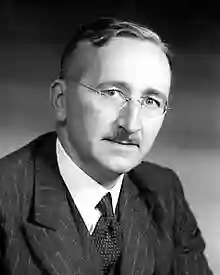
In this context education is significantly delivered by individuals who refuse to reduce education to education of the richest and I have witnessed that it is the educators who are championing access to education for those who are structured out – often via unpaid work and negotiations that they have to personally oversee in their own time, should they be trying to ensure an individual gets an opportunity to be valued through the higher education system.
Table of Contents
Introduction
Many think of education in Scotland as free and to that I respond that education is free in Scotland to those who can afford to take up the opportunity. For many, it is simply a stranded asset which belongs to another world; or as a friend Paddy acerbicly put it ‘adult creche for the well off’. As a metaphor, it is fine saying that skiing in Aspen is free to everyone in Scotland – the issue is getting there, maintaining your presence and having the necessary supplies. Another thing I have heard is the notion that there are support systems in higher education to help those who most need…
…to this my experience says that the support systems in higher education are wrecks – underfunded, understaffed, and the staff who work in these precarious job roles are constantly undermined by their shonky contracts and the extremely limited things which they can do. Student support systems are in my experience staffed by exhausted and semi-traumatised individuals in work situations that have high staff turnovers.
Getting support involves being a squeeky wheel, and a wheel of the right size and shape. It is a highly bureaucratised route which, for some, is highly traumatising for the sheer number of other systems (wrapped up in chains of dependencies) you have to wrangle in order to get practical support makes it onerous if not down-right Kafka-esque. It is illness inducing.
The result in this outcome of a financialised utilitarian policy landscape where services are set in default triage mode is that low hanging fruit becomes the fodder of people responding to the ‘key performance indicators’ they have been told to respond to. The result is increasing amounts of mental ill health in staff and student populations, and increasing recourse to gaming the benal (See Hanna Arendt) digitised bureaucratic tracking environments simply for staff to keep body and soul together – because first priority they must make is to keep the job which feeds them with the idea that without keeping their job, they will not be able to help anyone…
So, what follows is an expanded version of the essay I handed in for Public Sociology in light of the invitation extended to me to apply to the MSc in Mad Studies – a course which looks critically at the activities of psychiatry in society. In particular, the academics running the course invited me because they knew of my work in the community context via Ragged University. When I told them I had no formal qualifications they engaged a lesser used policy called ‘Accreditation of Prior Knowledge’ and made an argument for my inclusion in the course via ‘Widening Participation’ policy.
Not only this but they then had to go the extra mile and find funding from the Sean Connery fund in order for me to participate in the course. No money went to me at all, it was just a transfer of money into the coffers of Queen Margaret University. I tried to engage student support services but found them utterly overwhelmed to such an extent that they were not even responding to my communications. I was to find that the whole administrative system of the university is a disaster zone, primarily because of the digital systems which have been put in place in order to administrate the collective activities.
Whilst my experience of the teachers and teaching was a great one, my experience of the administrative and digital systems has been one of dysfunctional, inappropriate, badly configured technologies delivered by for profit corporate companies. The whole of Queen Margaret University seems to be riddled with multinational supply chains syphoning off money out of the higher education sector which is technically a charity. I am extremely grateful to those educators for fighting for opportunity to be opened to me as I have found that paid opportunities migrate to those who have a formal qualification no matter how much one can out perform other candidates, so those without qualifications are screened out by official society and the result is that it is a life of doing unpaid meaningful work which keeps you from going insane, or not doing meaningful work and becoming damaged.
In many ways this whole foray into formal education as a student I planned as a natural experiment especially as for the last 15 years or so I have worked closely with so many academics. I went into this course in order to document the educational experience as I encountered it and compare it to the policy documents which are used to represent the student experience. I will leave the introduction there because the essay goes into the details…
Public Sociology Practice: Widening Participation in the Neoliberal University
In this essay I argue that my invitation to participate on the Mad Studies MSc course at Queen Margaret University has been an act of Public Sociology embodied by academics in the face of the Higher Education sector as it is currently being reconfigured from public good to part of the Neoliberal project of enclosure.
I refer to the extending of admissions policy to value knowledge produced outside of academia (accreditation of prior learning by demonstration of quantity and quality of work) that opened opportunity to myself as a student at Masters level. I see this as a realisation of Widening Participation policy with the role university as a public good and organ of human development, in resistance to the zeitgeist of the university as a profit bearing business (MOLESWORTH, SCULLION & NIXON, 2010).
Excerpt: Transforming education as a public good into a profit bearing business
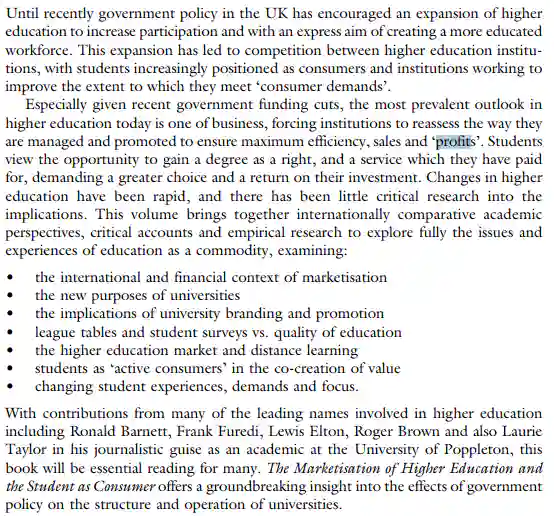
MOLESWORTH, M., Scullion, R., Nixon, E., (2010), The Marketisation Of Higher Education And The Student As Consumer, Routledge. pp. 2
My inclusion in this course occurred in an increasingly corporatized sector where Widening Participation tends to be vague and/or abused policy utilised for a sort of ‘ethics washing’ of education operating as a marketed and financialised product – and where the student is branded as a ‘consumer’. In big picture terms it is a policy generally encountered as vacuous and used to facilitate the reproduction of inequalities and social exclusion in academia and ultimately wider society (BURKE, 2012).
Excerpt: Burke critical analysis of widening participation policy

Burke, P. J. J. (2012). The Right to Higher Education : Beyond widening participation. Taylor and Francis. Pp.189
I start with identifying key aspects of Public Sociology touching on contexts where its practice might be understood as operating. I examine the dynamics of theory to bring into relief how Public Sociology is embodied in various settings through the actions of individuals. This positions researchers and their reports as making public the Neoliberal project and the outcomes which are manifest in our lives.
I lay out an historical and sociological picture of higher education in the current paradigm of Neoliberal enclosure of public goods, and the monetization of the lives-of-learners as financial products; a process which is happening in parallel to healthcare and social services (BARROW, 2021). This establishes the context in which various publics operate to make explicit the situational forces (ZIMBARDO, 2009) that shape sociological outcomes. I postulate modern credentialism in its emerging totality as a reconstruction of class control which dates back to a colonial project to Feudal-Manorial times (DUNEDIN, 2023).
Excerpt: Barrow’s article on children in foster care being sold as commodities
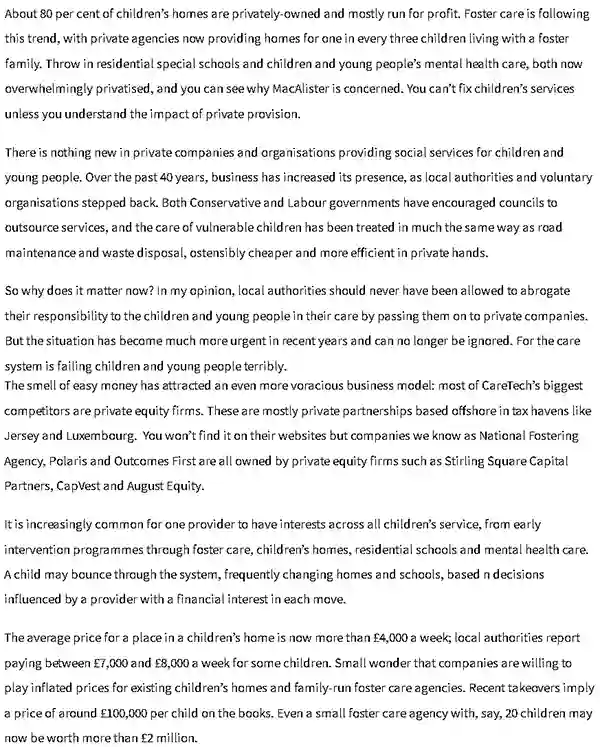
BARROW, M., (2021), Privatisation of children’s services is bad for children and bad for taxpayers, Transparency Project, Taken from internet, 15/7/24: https://transparencyproject.org.uk/privatisation-of-childrens-services-is-bad-for-children-and-bad-for-taxpayers/
Excerpt: Zimbardo on the influence of situational forces to shape behavioural outcomes
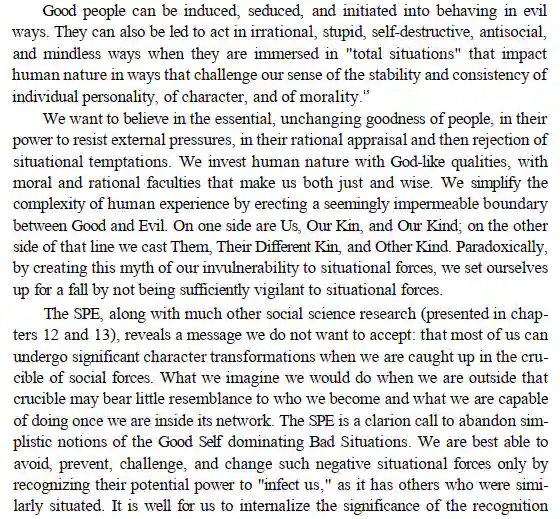
ZIMBARDO, P. G., (2009), ‘The Lucifer Effect: How Good People Turn Evil’, Pp. 211
Excerpt: The recaptulation of the feudal/manorial project in Britain
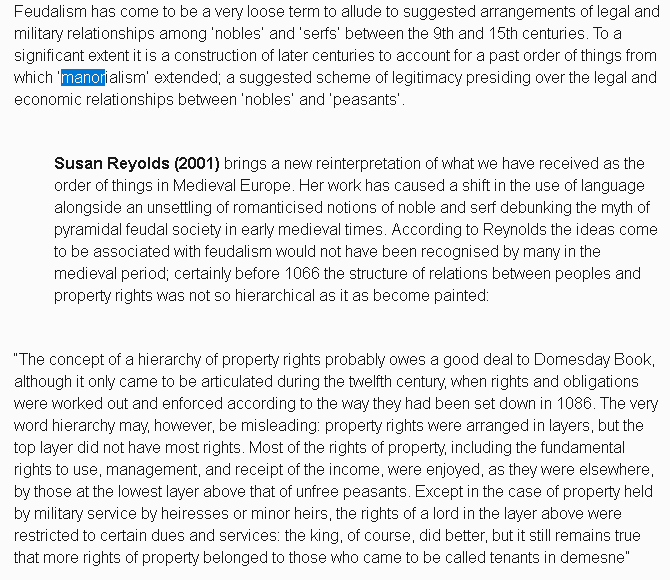
DUNEDIN, A., (2023), Working Classness as a Topology of Finance and Status. Taken from Internet 2.6.2024: Https://Raggeduniversity.Co.Uk/2023/08/27/Working-Classness-Class-As-A-Topology-Of-Finance-And-Status/
After describing the theory and practice of constitutive elements of Public Sociology I go onto give an account of the sociological setting in which Higher Education operates. I detail how education as a public good has been targeted for marketisation as a larger project of economic project of enclosure; this gives the context as the social issue.
The context also defines the publics implicit in the subject of my case study of Public Sociology – the educators in the academic setting who realised Widening Participation policy based on values of social justice in the corporate university. To conclude I summarize the impact of this in terms of opening up better futures which otherwise would have been closed to me due to lack of finance and the cultural invalidation of my innately owned human capital.
Public Sociology as a Focal Lens
Public Sociology operates as a form of sociology which emerges through responses to social problems, but in particular it is necessarily located within social justice practices (BURAWOY, 2005, pp. 260). Michael Burawoy suggests sociology’s principle anchor points as contributions to the public good and orientations which act in “defense of civil society” (BURAWOY, 2005, PP. 259). As the coiner of the term ‘Public Sociology’ he identifies the phenotype of sociological practice as involving a “systematic back-translation, taking knowledge back to those from whom it came, making public issues out of private troubles”.
Abstract and excerpt: Burawoy connects Public Sociology with social justice and civil society

BURAWOY, M. (2005), ‘2004 American Sociological Association Presidential address: For public sociology’. The British Journal of Sociology, 56 pp. 259-294
This means that it is not enough to observe and derive an intellectual product from efforts observing a social setting. Rather Public Sociology necessitates an iterative re-engagement with a site of social distress. As such it acts both as the location of learning and a social juncture with intentions of contributing to resolving problems. It requires a willingness to operate across perceived disciplinary boundaries and to be itinerant in order to arrive at where publics and their knowledge reside.
Public Sociology requires language learning and language reformation in order to engage reflexively with a reality-checking process in conjunction with holders of alternative perspectives of the actual. It is via a modality of dialogue – call and response, symbiosis and tension, challenge and synthesis – that knowledge representative of a plural experience can be reached for and ultimately contributed to civil society in a search for better futures.
As the focus of the discipline changes with its context, it is vital to recognise that ‘Public Sociology’ operates in many spaces without necessarily being named as that. We might think of a setting in which a nurse blows a whistle on senior doctors for practices which bring about harms to a patient (LAURANCE, 2009), or where a doctor blows a whistle on managerial practices which are debilitating a public service (BUCHANAN & LANGTON, 2023).
Excerpts: Public sociology in medicine
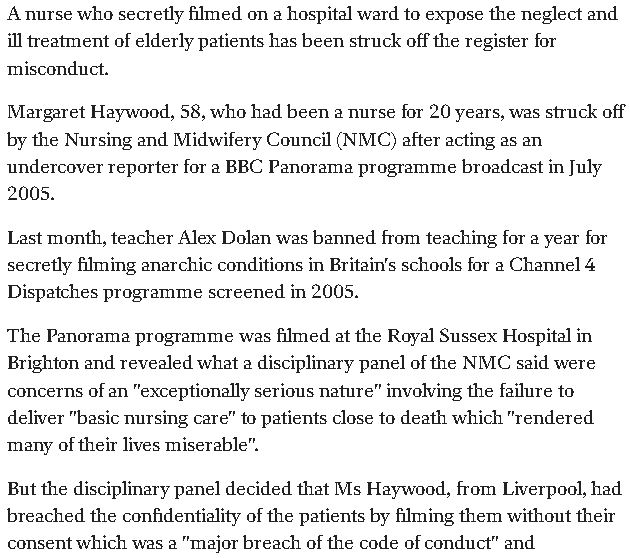
LAURANCE, J. (2009), Whistleblower Nurse Struck Off Over BBC Film. Taken from Internet 2.6.2024: Https://Www.Independent.Co.Uk/Life-Style/Health-And-Families/Health-News/Whistleblower-Nurse-Struck-Off-Over-Bbc-Film-1669954.Html
Excerpts: Public sociology in medicine
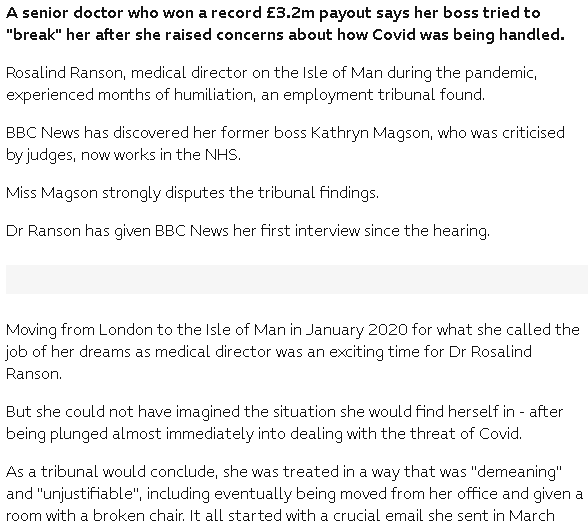
BUCHANAN, M. & Langton, K., (2023), Humiliated Covid Whistleblower Says Boss Tried To ‘break’ Her. Taken from Internet 2.6.2024: Https://Www.Bbc.Com/News/Health-67565498
We may think of where members of a community highlight and make visible abuses by police or civil servants (DMIP, 2021), or where public figures take interest in the polluting of a local eco-system in order to reveal knowledge of the impacts to distant and sometimes errant overseers such as DEFRA (MONBIOT, 2024).
Excerpts: Public sociology in policing and environment
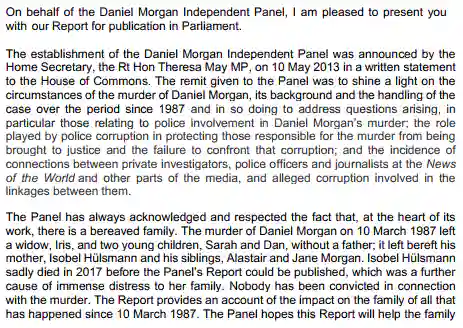
DMIP (2021), Daniel Morgan Independent Panel. Taken from Internet 2.6.2024: Https://Webarchive.Nationalarchives.Gov.Uk/Ukgwa/20220331104035/Https://Www.Danielmorganpanel.Independent.Gov.Uk/The-Report/
Excerpts: Public sociology in policing and environment
MONBIOT, G., (2024). Taken from Internet 2.6.2024: Https://Rivercide.Tv/
We may bring to mind the campaigning of civilians in highlighting the use of medical force in order to resolve collective cognitive dissonance surrounding behaviours (DICKINSON, 2016) that do not get given place in society’s Regime of Truth (FOUCAULT, 1977); alternatively we may bring to mind protests to reveal unacknowledged lasting and devastating side effects of prescription medications (SAMBROOK, 2015).
Excerpt: Public sociology exposes abuse of psychiatry to enforce sexual perspectives
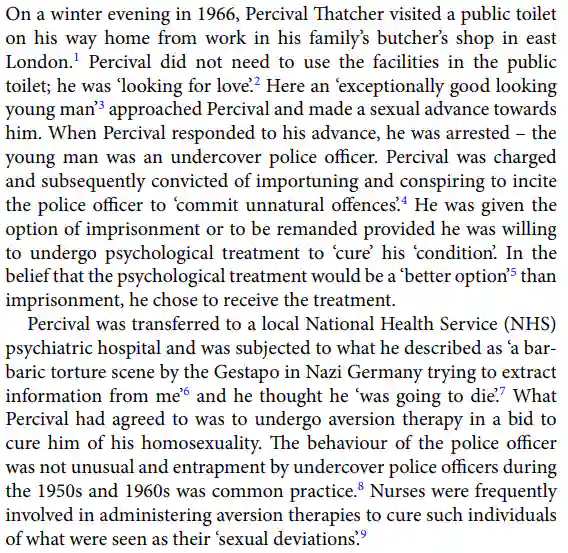
DICKINSON, T. (2016). ‘Curing Queers’: Mental Nurses And Their Patients 1935-74. Manchester University Press
Excerpt: How Foucault defines ‘Regime of Truth’

FOUCAULT, M. (1977) ‘The Political Function Of The Intellectual’, Radical Philosophy 17, Summer Pp. 12-14
Excerpt: Public sociology of revealing pharmaceutical harms
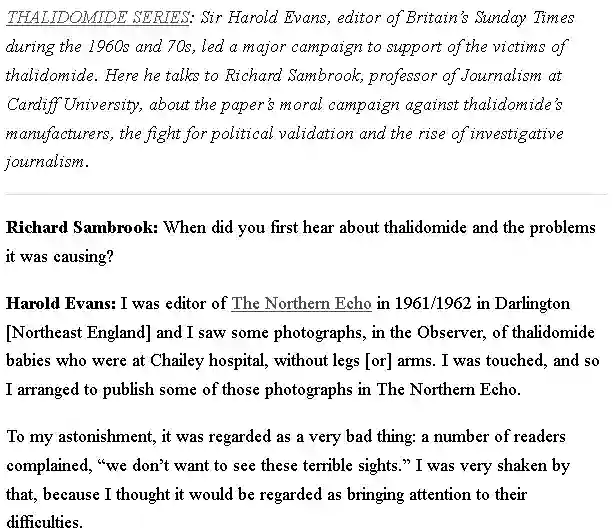
These examples all involve the study and personal involvement with social problems which may be understood as acts of Public Sociology. To use an analogy within academia; Action Research is to Research, what Public Sociology is to Sociology – the practice is value oriented and impelled to bring about change in the world rather than function as the euphemistic ‘academic exercise’. In effect it is a term for real world embodiment of the study of human social relationships, processes and institutions in order to further the public good.
With these understandings it is possible to situate Public Sociology as interfacing with Human Rights settings. In this essay I am particularly interested in examining the context of the Mad Studies MSc in Queen Margaret University as a corporate Higher Education Institution structured by Neoliberal policy and delivered through Educational Technologies forged in the white heat of the revolution we are seeing – digital tools as mediators of Surveillance Capitalism (ZUBOFF, 2019) and scientific management (LOCKE & SPENDER, 2011).
Excerpt: Surveillance capitalism as functioning in higher education
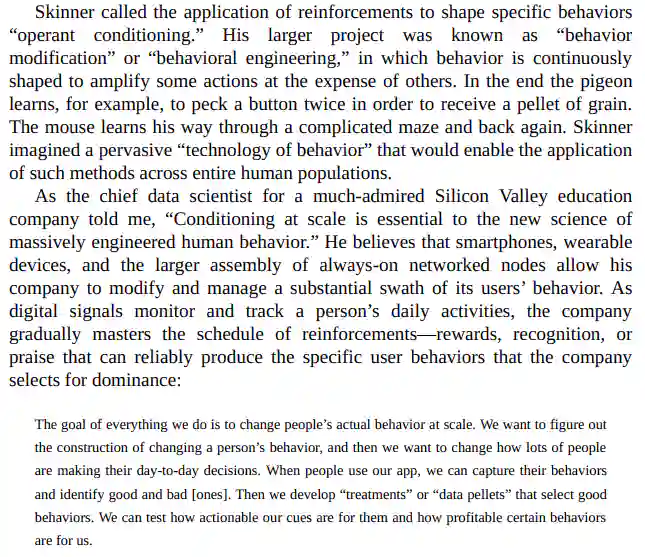
ZUBOFF, S. (2019). The Age Of Surveillance Capitalism : The Fight For A Human Future At The New Frontier Of Power (First Edition). Public affairs.
Click here to download introduction and chapter one
Excerpt: Scientific Management as functioning in higher education
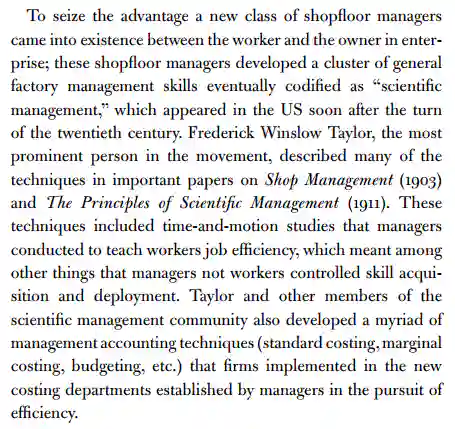
LOCKE, R. R. & Spender J.-C. (2011). Confronting Managerialism : How The Business Elite And Their Schools Threw Our Lives Out Of Balance. Zed Books
In order to qualify my argument I must first build a historial sociological account of how the Higher Education Institution has come to be in the societal position it is in. The context determines how the ‘external’ public (people who have no ‘formal qualifications’) and the ‘internal’ public (people who operate as educators) relate to the educational process as mediated by the structuring of the institution. In the next section I will be detailing how credentialism can be understood as extending the projects of empire and social control.
Credentialism: The Re-Invention of Empire and Class Control
In the twenty first century most populations are born into circumstances in which they are dependent on the mechanisms of civil society for attaining sufficiency and the conditions for human development. In rudimentary terms there is no possibility for people to dig a furrow in the earth, plant out crops and make their own shelter due to the enclosure of land and the commons (DUNEDIN, 2023).
Excerpt: Lack of opportunity due to the enclosure of land and the commons
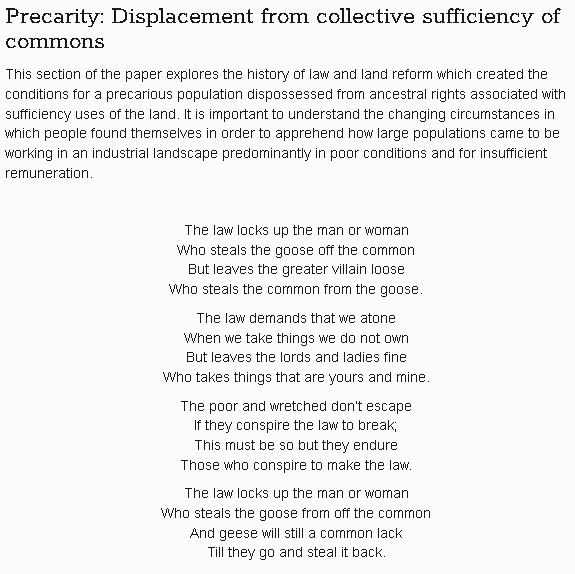
DUNEDIN, A., (2023), Working Classness as a Topology of Finance and Status. Taken from Internet 2.6.2024: Https://Raggeduniversity.Co.Uk/2023/08/27/Working-Classness-Class-As-A-Topology-Of-Finance-And-Status/
In our highly technocratic credentialised society (TOMLINSON & WATERMEYER, 2020) it is not enough to possess our innately owned human capital (OECD, 2011) in order to thrive as it was in the past. Our natural skills and innate capacity for labour have been largely enclosed by a bureaucracy via which individuals must be validated in order to participate in highly controlled societal systems like work opportunities. This role of validation is fulfilled by educational institutions.
Excerpt: Credentialism, commodification and higher education
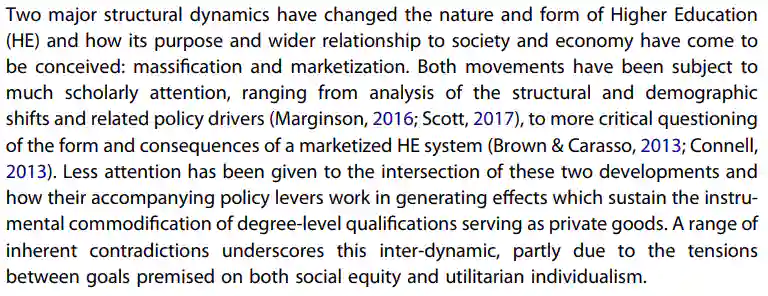
TOMLINSON M., & WATERMEYER, R., (2020): When Masses Meet Markets: Credentialism And Commodification In Twenty-First Century Higher Education, Discourse: Studies In The Cultural Politics Of Education
Excerpt: It is not enough to have competence, formal qualifications are needed

OECD, 2011 Education At A Glance: Oecd Indicators – 2011 Edition. Paris: OECD. page 44
In the longer course of British history higher education was once largely the preserve of the wealthy. It was at the same time as the enclosure of the commons in Britain, a project which alienated communities from the material means of sufficiency, that people were also alienated from their intellectual capital through the introduction of a statutory law – the Statute of Artificers (ATIYAH, 2003).
Excerpt: The beginning of the enclosure of intellectual capital in British law
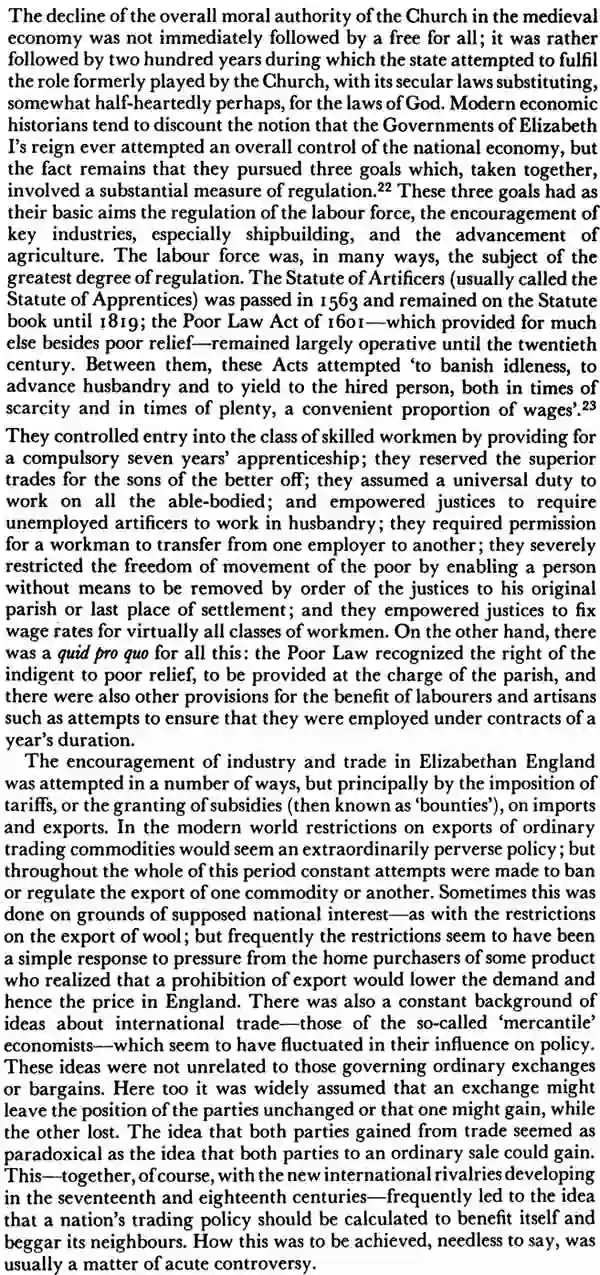
ATIYAH, P. S. (2003). The Rise And Fall Of Freedom Of Contract. Oxford: Clarendon Press. Page 67
This law came to denominate who could operate in which role, reserving for aristocratic males key professions whilst locking the rest of the population into working the land (husbandry) under the Feudal-Manorial system. This period of history in Britain denoted an imposition of cultural control at a scale never seen before in Europe (HECKSCHER, 1994).
Excerpt: Unprecedented control of British industry
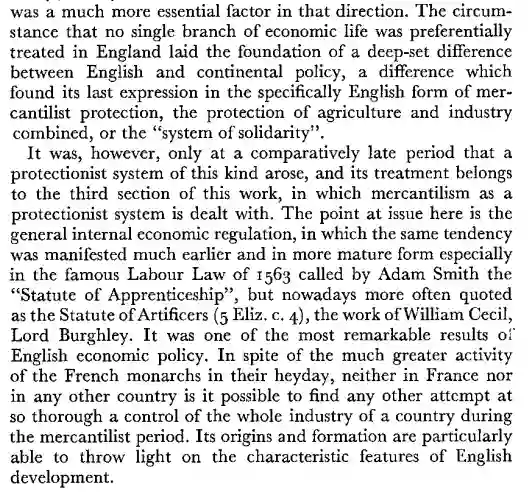
HECKSCHER, E. F. (1994). Mercantilism. Routledge: Taylor And Francis. Page 226
I suggest that this project served to impose and harden a class structure in the legal system which has patterned British society to this day. This massive project of intergenerational cultural control, often euphemistically related/conflated as ‘land improvement’, introduced the means to enforce geographic boundaries locking people in their locale to do the work which they were allocated to. As bureaucracy – ‘governance from a central point’ – evolved as a technology, so expanded the reach of the privileged to enact greater and greater levels of control over the lives of the people en masse. This is relevant to understanding how education today may be understood as a similar use of governance.
In the nineteenth century we saw the nature of education change through the rise of popular education as a response to poverty (SCHUPF, 1972) and destitution in the face of long enacted colonial practices both at home and abroad. In order to understand the functioning of education today it is essential to have a macroscopic picture of the political economy at work. The twentieth century saw the reconfiguration of coloniality via the construction of the financialism of The City of London and its extensive network of tax havens (SHAXSON, 2012).
Excerpt: Popular education as a response to poverty
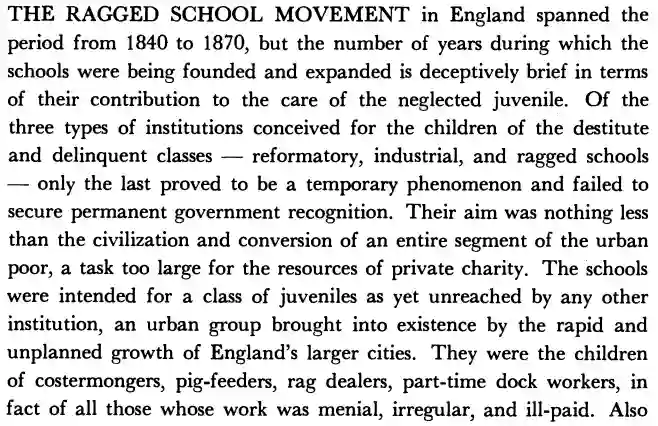
SCHUPF, H.W. Education For The Neglected: Ragged Schools In Nineteenth-Century England. History Of Education Quarterly. 1972;12(2):162-183. Doi:10.2307/366975
Excerpt: Construction of financialism and tax havens

SHAXSON, N. (2012). Treasure Islands: Uncovering The Damage Of Offshore Banking And Tax Havens St. Martin’s Griffin. pp.16
In terms of political economy, in 1952 Harold MacMillan wrote “This is the choice to slide into a shoddy and slushy socialism, or the march to the third British Empire.” (SHAXSON, 2018, pp. 66). From the 1950’s the Conservative party of Britain adopted a policy plan of developing ‘shareholder democracy’ (RUTHERFORD, 2020). In the following decades the infrastructure of empire was to reinvent itself through a Neoliberal apparatus enmeshed with tax havens as detailed by Nicholas Shaxson in his book ‘The Finance Curse: How Global Finance is Making us all Poorer’:
Excerpt: Harold MacMillan’s project of the third British Empire

SHAXSON, N. (2018). The Finance Curse: How Global Finance Is Making Us All Poorer. The Bodley Head. pp.66
Click here to download introduction and chapter one
A friend and teacher, Donald Rutherford and I would debate aspects of economics over a long stretch of time where he had taught me by giving a range of books, handouts and by discussing various parts of economic history which he taught at the University of Edinburgh. In discussing and debating the rise of the stock market and the financial markets he impressed upon me that the Conservative Party had held a policy of developing what they called a ‘shareholder democracy’ since the 1950s.
RUTHERFORD, D., (2020), Personal Correspondence
“the first seeds of trouble were sown in the 1950s, an era when Britain lost its empire and when the City of London faced powerful democratic forces at home which curbed its profits and its power, and which delivered unprecedented growth to other parts of the economy. The City then began to construct a new globalised financial model, which was so successful for the City that some have described its rebirth as the dawn of a second British empire. After these early beginnings, this new model began to emerge in the 1970s” (SHAXSON, 2018, pp. 18).
If we pay attention to the work of Prof Nick Robins, then we can see how the modern multinational corporation as an organisational structure may be traced in origin to the East India Company (ROBINS, 2017). At the end of the twentieth century following the successful coup which the Thatcher administrations had delivered on public goods, the education system became the target of venture capital specifically targeting education as a “market opportunity” (ERTI, 1998).
Excerpt: The modern multinational corporation is based on the East India Company
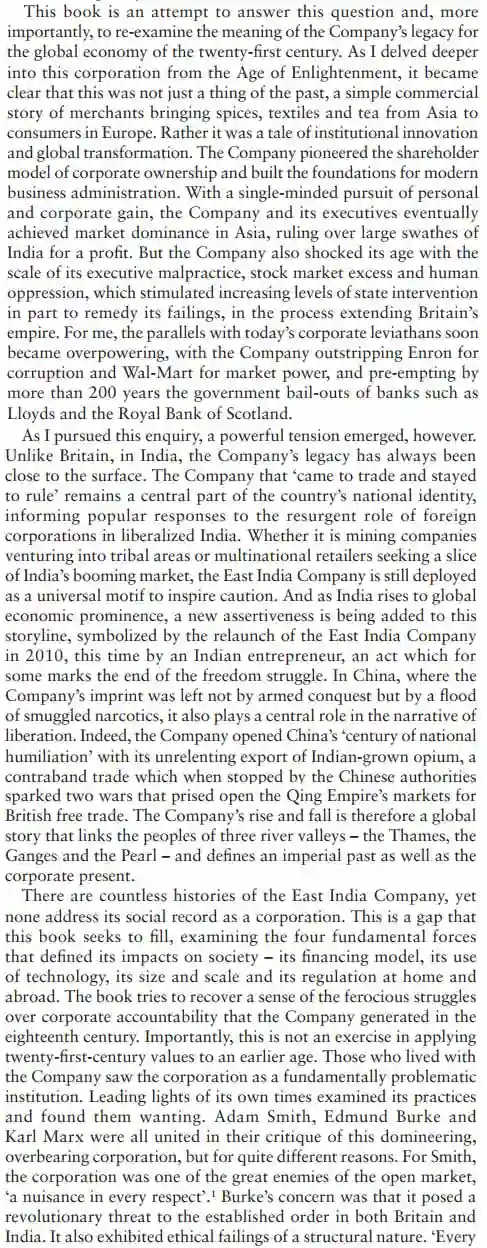
ROBINS, N., (2017). The Corporation That Changed The World: How The East India Company Shaped The Modern Multinational. Pluto Press, Page Xii
Excerpt: Industrialists size up education as a market opportunity

ERTI, (1998), European Round Table Of Industrialists, November 1998, Job Creation And Competitiveness Through Innovation, ERT, Brussels
This information enables us to understand the ‘organisational DNA’ at work in political economy terms as education/public goods are expropriated from nations and the live of people for multinational profiteering. In the next section I will be examining the impacts of demarcating people out of cultural valuation and interrogating the realities of Widening Participation policy in light of what we have just covered.
Further Enclosure of Innately Owned Human Capital
Although Higher Education in the past was the preserve of the wealthy, it is now arguably a necessity in an age of credentialism (TOMLINSON & WATERMEYER, 2020) which has come to enclose nearly every aspect of work opportunity (FORBES, 2023; BLOOMBERG, 2023). Without formal qualifications people are doomed to insufficiency, to being passed over for opportunities, job interviews and promotions underpinning an economy where people are exploited by employers via their economic precarity (JRF, 2022; JRF, 2024; IFHE, 2022).
Excerpt: Marketisation of education exacerbating structual inequalities

TOMLINSON M., & WATERMEYER, R., (2020): When Masses Meet Markets: Credentialism And Commodification In Twenty-First Century Higher Education, Discourse: Studies In The Cultural Politics Of Education
Excerpt: Employers prefer candidates having a degree

FORBES, (2023), Taken from Internet 2.6.2024: Https://Www.Forbes.Com/Sites/Dereknewton/2023/11/30/Survey-Hiring-Managers-Still-Strongly-Value-A-College-Degree/ NEWTON, D., 2023 Survey: Hiring Managers Still Strongly Value A College Degree
Excerpt: Employers prefer candidates having a degree

BLOOMBERG, (2023). Taken from Internet 2.6.2024: Https://Www.Bloomberg.Com/Graphics/2023-06-Reed-Jobs-Report-Graduates-Face-Worst-Market-In-Five-Years/ Zulfiqar, A. A., White, L., Tartar, A., England’s Graduates Suffer The Worst Jobs Market In Years
Excerpt: Without formal qualifications are more likely to be trapped in poverty
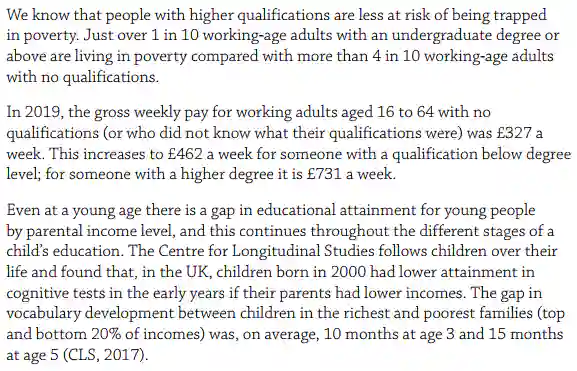
JRF, 2022, UK Poverty The Essential Guide To Understanding Poverty In The UK, Joseph Rowntree Foundation
Excerpt: Without formal qualifications are more likely to be trapped in poverty
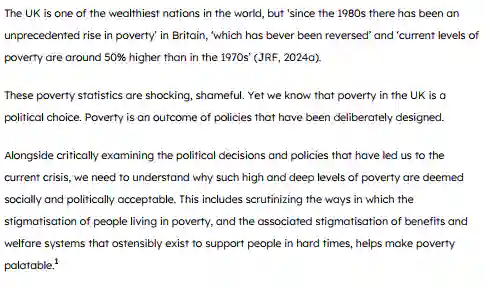
JRF, 2024 Imogen TYLER And Sarah CAMPBELL Poverty Stigma: A Glue That Holds Poverty In Place, Joseph Rowntree Foundation
Excerpt: Without formal qualifications are more likely to be trapped in poverty
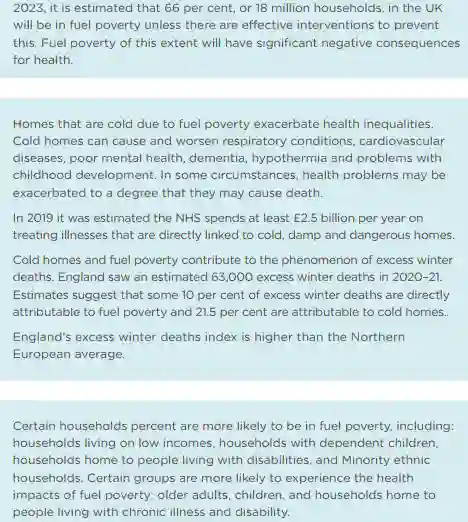
IFHE, 2022, Institute Of Health Equity Fuel Poverty, Cold Homes And Health Inequalities In The UK. Taken from Internet 2.6.2024: Https://Www.Instituteofhealthequity.Org/Resources-Reports/Fuel-Poverty-Cold-Homes-And-Health-Inequalities-In-The-Uk
To measure the cost of such a sociological configuration, the stress of precarity may be measured in terms of disease and shortened life expectancy when we take stock of longitudinal large scale research such as that produced by Michael Marmot and colleagues (MARMOT & WILKINSON, 2003; MARMOT ET AL., 1991). Coining the term “Status Syndrome” these large and well respected studies demonstrate how the lower down in the socio-economic spectrum someone subsists, the greater the number of illnesses and the shorter their lifespan (MARMOT, 2005).
Excerpt: Stress and precarity as causes of disease and shortened life
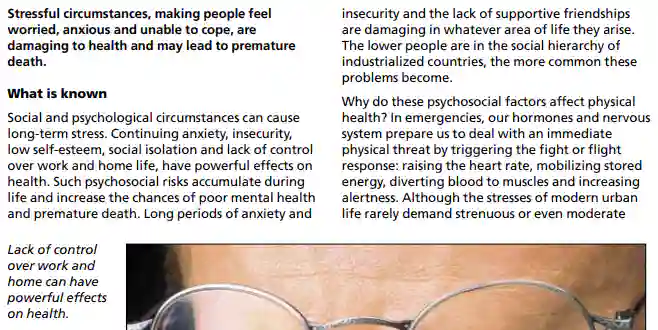
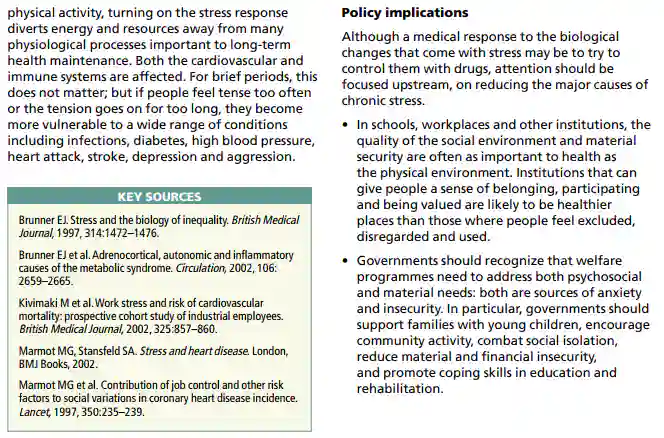
MARMOT, M., WILKINSON, R. G. (2003). The Solid Facts. Copenhagen: World Health Organization, Regional Office For Europe. Isbn 9780585492520
Excerpt: Stress and precarity as causes of disease and shortened life

MARMOT, M. G., SMITH, G. D., STANSFELD, S., PATEL, C., NORTH, F., HEAD, J., WHITE, I., BRUNNER, E., FEENEY, A., (1991), ‘Health Inequalities Among British Civil Servants: The Whitehall II Study’. Lancet 1991;337:1387-1393
Excerpt: Stress and precarity as causes of disease and shortened life
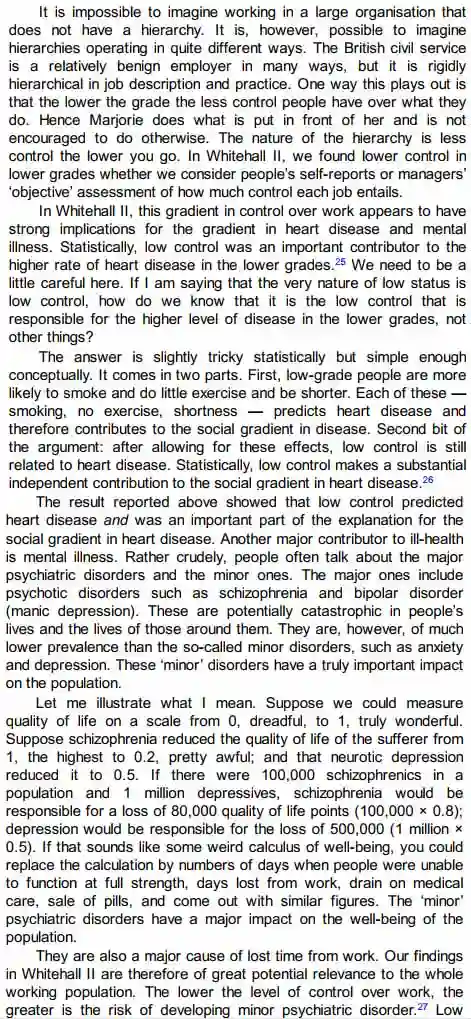
MARMOT, M. G. (2005). Status Syndrome : How Social Standing Affects Our Health And Longevity (1st Owl Books Ed). Henry Holt
Viewed in this way population-wide access to acknowledgement/validation of human capital (BURTON-JONES & SPENDER, 2011) may be understood as an essential part of human development relating to human rights (ARTHUR, 2001). This framing of Higher Education as a Public Good (SEN, 2000) abuts against the orienting of higher education as a financialised product (KOTZMANN, 2018).
Excerpt: Acknowledgement/validation of human capital
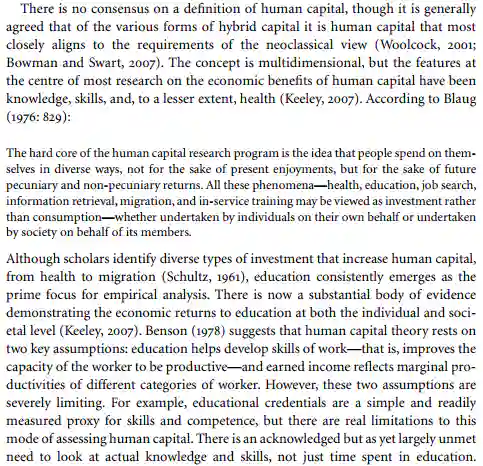
Burton-Jones, A., & Spender, J.-C. (2010). The Oxford handbook of human capital. Oxford University Press. Pp. 76
Excerpt: Acknowledgement of actual knowledge and skills outside of formal education

ARTHUR, M., Education And The Law 2001-Dec Vol. 13 Iss. 4 The Human Rights Act And Higher Education (2001) P53
Excerpt: Education as a public good
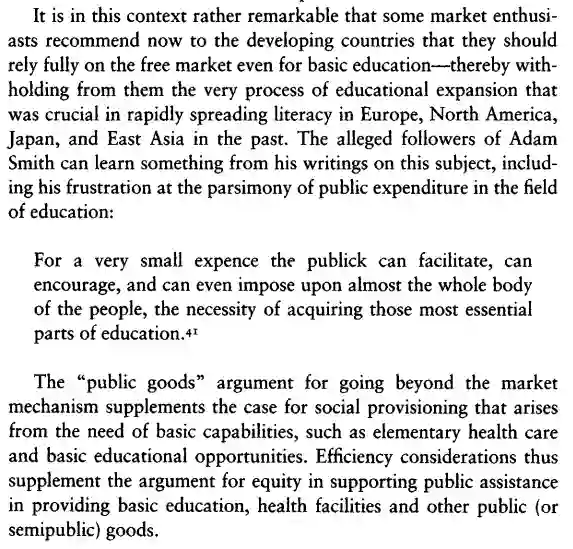
SEN, A. K., (2000), Development As Freedom, Alfred A. Knopf, Inc. (2000) Page 129
Excerpt: The Human Rights-Based Approach To Higher Education
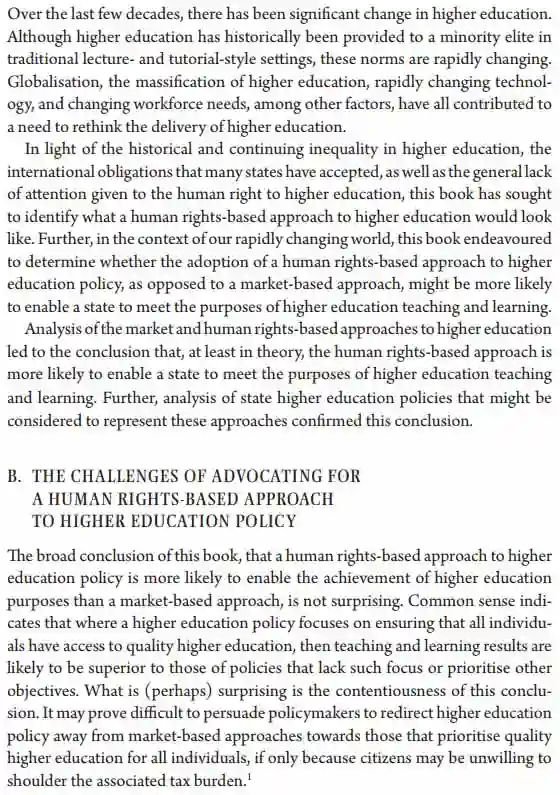
KOTZMANN, J., The Human Rights-Based Approach To Higher Education Why Human Rights Norms Should Guide Higher Education Law And Policy, Oxford University Press (2018)
If the institution of education caters dominantly to those who can financially afford to participate (KROMYDAS, 2017), then it functions to re-constitute the class structures (SIMMONS & SMYTH, 2018) that serve to exclude populations from essential opportunities required to improve wellbeing and ultimately to avoid chronic illness and diminished lifespan (MARMOT & WILKINSON, 2006).
Excerpt: Higher education caters for those who can financially afford to participate
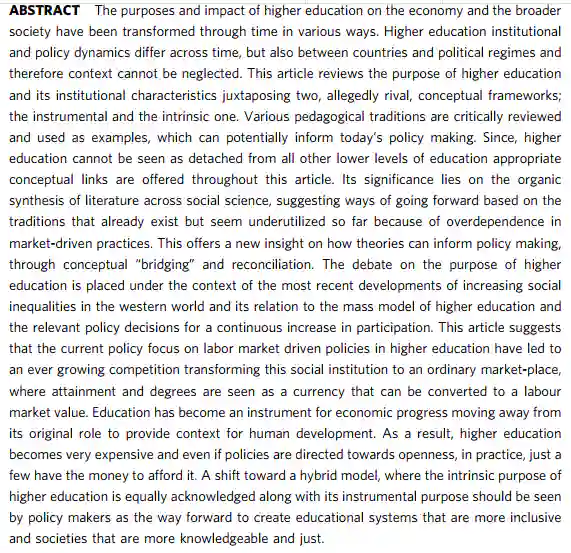
KROMYDAS, T. (2017) Rethinking Higher Education And Its Relationship With Social Inequalities: Past Knowledge, Present State And Future Potential. Palgrave Commun 3, 1
Excerpt: Formal education functions to re-constitute the class structures

SIMMONS, R., SMYTH, J. (2018). Education And Social Class: How Did We Get To This And What Needs To Change?. In: Simmons, R., Smyth, J. (eds) Education And Working-Class Youth. Palgrave Macmillan, Cham. Taken from Internet 2.6.2024: Https://Doi.Org/10.1007/978-3-319-90671-3_10
Excerpt: Exclusion of populations from essential opportunities required to improve wellbeing


MARMOT, M.,Wilkinson, R. G., (2006) [1999]. Social Determinants Of Health (2nd Ed.). Oxford/New York: Oxford University Press. ISBN 9780198565895, Pp.
The current configuration continues the legacy of old regimes where protected professions are monopolized for privileged patriarchy and where health-degrading and exploitative work is reframed as opportunity for the rest of the population (ATIYAH, 2003).
Excerpt: Professions monopolised by the sons of the better off
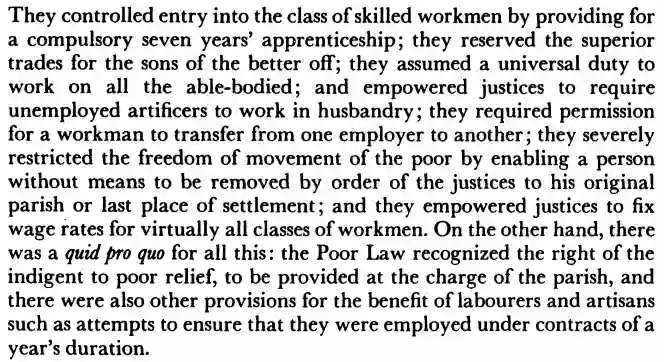
ATIYAH, P. S. (2003). The Rise And Fall Of Freedom Of Contract. Oxford: Clarendon Press. Page 67
The Higher Education-Industrial complex and its credentialism fosters a culture of exceptionalism, (PRITCHARD, 2012) class (SOTIRIS, 2017) and caste (JAVED, 2021; COX, 1944; BELL, 2022) that is interwoven with the mythology of elite meritocracy (meritocracy for the wealthy; impoverished indentureship for the rest) (MARTINI & ROBERTSON, 2022; REAY, 2021; O’BRIEN & STEVENSON, 2024) which masquerades as a system of equity (FARQUHARSON, MCNALLY & TAHIR, 2022) and where populations are made to compete against each other for earmarked ‘charitable’ opportunity (WYNESS, 2016; HARVEY, 2024).
Excerpt: The Higher Education-Industrial complex and its credentialism fosters a culture of exceptionalism

PRITCHARD, R.M. (2012). British Higher Education: “Exceptionalism” In Face Of The Bologna Process? Beiträge Zur Hochschulforschung 29 Jan 2012
Excerpt: The Higher Education-Industrial complex and its credentialism fosters a culture of class
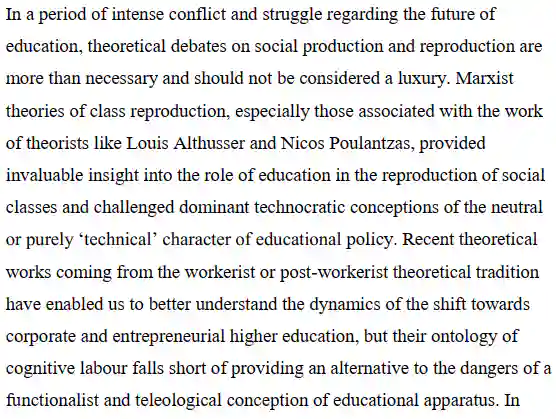
SOTIRIS, P., (2017), Higher Education And Class: Production Or Reproduction? In Darder, A., Mayo, P., & Paraskeva, João. (2017). International Critical Pedagogy Reader (First Edition). Taylor And Francis
Excerpt: The Higher Education-Industrial complex and its credentialism fosters a culture of caste
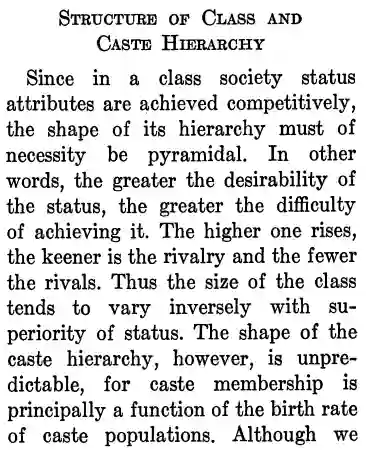
…
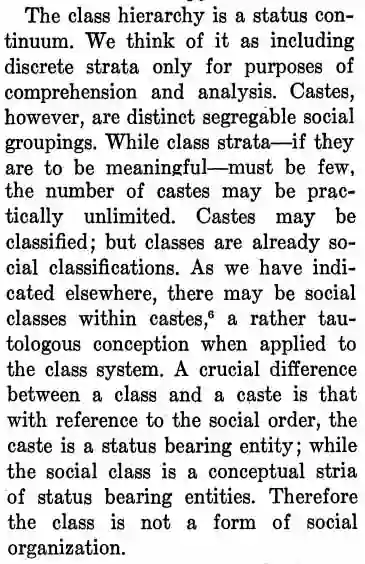
COX, O. C. (1944). Class And Caste: A Definition And A Distinction. The Journal Of Negro Education, 13(2), 139. Doi:10.2307/2292848
Excerpt: The Higher Education-Industrial complex and its credentialism fosters a culture of exceptionalism

Javed, R., (2021) The caste system in India during British raj: (1872- 1941), International Journal of Development Research Volume: 11
Excerpt: The Higher Education-Industrial complex and its credentialism fosters a culture of caste
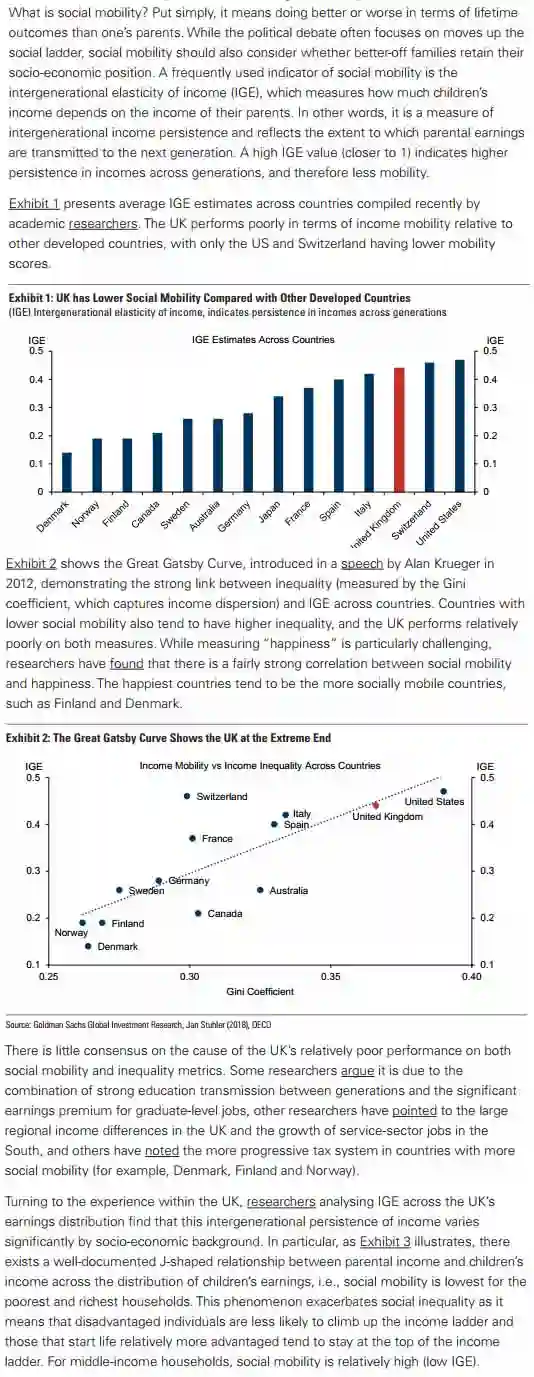
BELL, S., (2022), The Bigger Picture Uk Social Mobility – A Tough Climb, Taken from Internet 2.6.2024: Https://Www.Goldmansachs.Com/Intelligence/Pages/Gs-Research/Uk-Social-Mobility-A-Tougher-Climb/Report.Pdf
Excerpt: the mythology of elite meritocracy (meritocracy for the wealthy; impoverished indentureship for the rest)
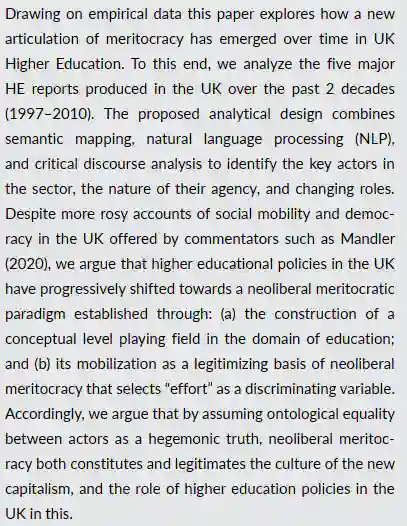
MARTINI, M., & ROBERTSON, S. L. (2022). UK Higher Education, Neoliberal Meritocracy, And The Culture Of The New Capitalism: A Computational-Linguistics Analysis. Sociology Compass, 16(12), E13020. Taken from Internet 2.6.2024: Https://Doi.Org/10.1111/Soc4.13020
Excerpt: the mythology of elite meritocracy (meritocracy for the wealthy; impoverished indentureship for the rest)

REAY, D., (2021), The Working Classes And Higher Education: Meritocratic Fallacies Of Upward Mobility In The United Kingdom. Eur J Educ. 2021; 56: 53–64. Taken from Internet 2.6.2024: Https://Doi.Org/10.1111/Ejed.12438
Video: the mythology of elite meritocracy (meritocracy for the wealthy; impoverished indentureship for the rest)
O’BRIEN & STEVENSON, G., (2024), James O’brien Meets Gary Stevenson, LBC,Taken from Internet 2.6.2024: Https://Www.Youtube.Com/Watch?V=46t6nk2vog8
Excerpt: elite meritocracy (meritocracy for the wealthy; impoverished indentureship for the rest) masquerades as a system of equity
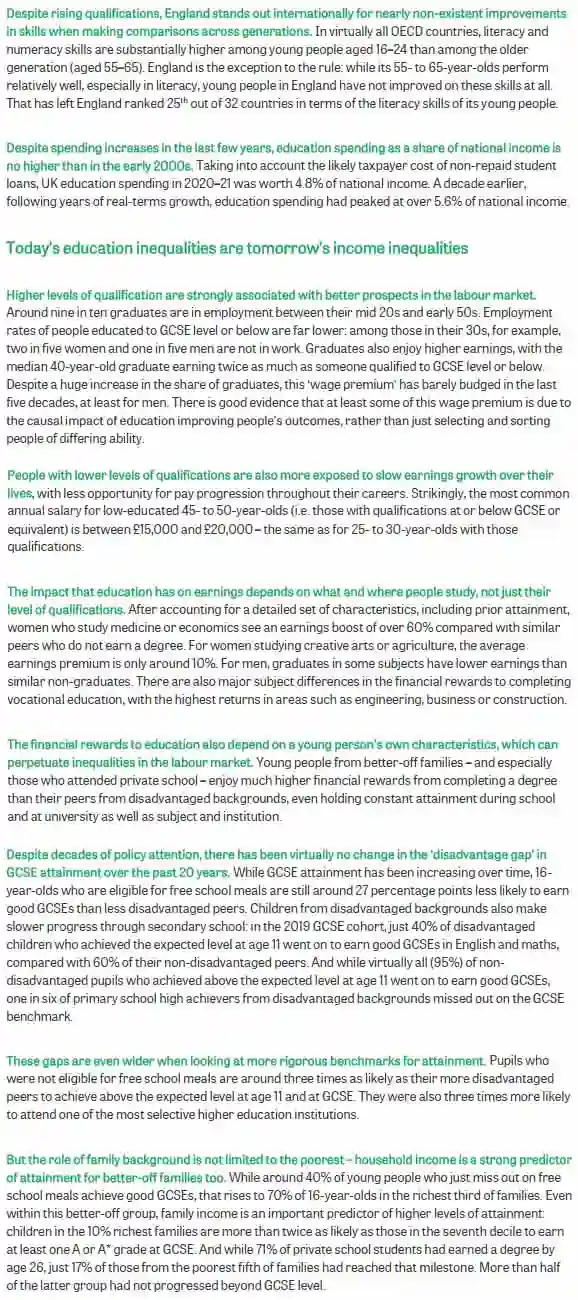
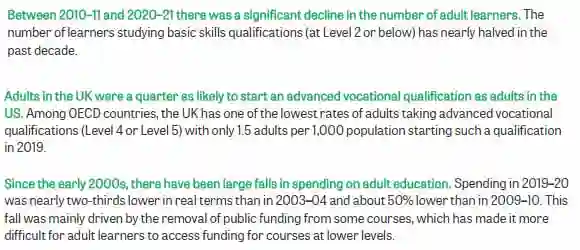
FARQUHARSON, C., MCNALLY, S., TAHIR, I., (2022), ‘Education Inequalities’, IFS DEATON Review Of Inequalities. Taken from Internet 2.6.2024: Https://Ifs.Org.Uk/Inequality/Chapter/Education-Inequalities/
Excerpt: Populations are made to compete against each other for earmarked ‘charitable’ opportunity
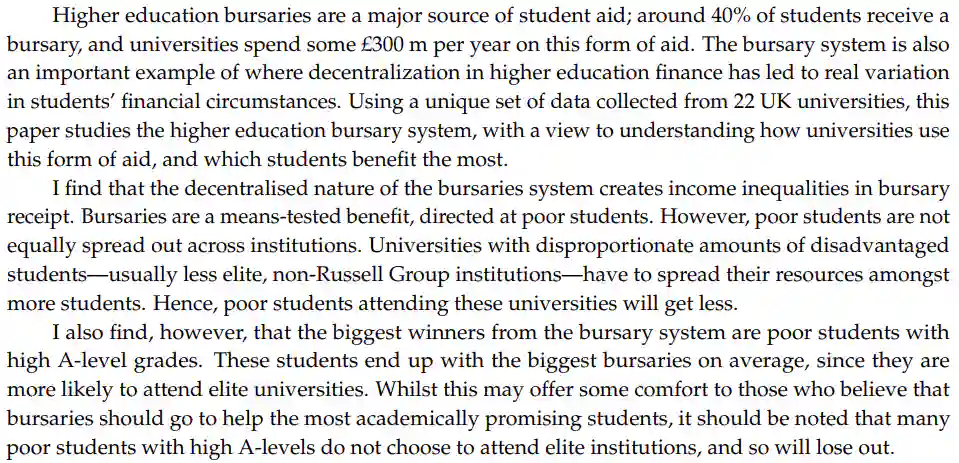
WYNESS, G., (2016) “Deserving Poor: Are Higher Education Bursaries Going To The Right Students?” Education Sciences 6, No. 1: 5. Taken from Internet 2.6.2024: Https://Doi.Org/10.3390/Educsci6010005
Excerpt: Populations are made to compete against each other for earmarked ‘charitable’ opportunity
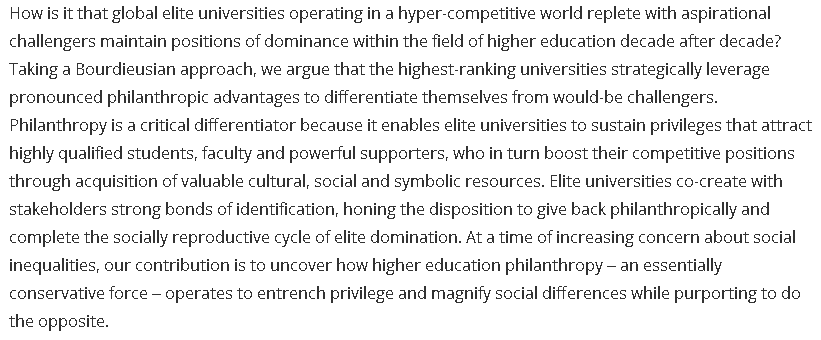
HARVEY, C., Gibson, A., Maclean, M., & Mueller, F. (2024). Philanthropy And The Sustaining Of Global Elite University Domination. Organization, 31(3), 433-457.
In this setting the Education-Industrial complex dovetails with the Charity-Industrial complex (INCITE, 2017) so well critiqued over centuries by commentators ranging from Mary Wollstonecraft (“Her condemnation of charity, like that of Godwin, sees it as sustaining an unequal society while giving the appearance of virtue to the rich” (JOHNSON, 2002) to Joel Bakan, Professor of Law (BAKAN, 2020).
Excerpt: the Education-Industrial complex dovetails with the Charity-Industrial complex

INCITE! (2017). The Revolution Will Not Be Funded: Beyond The Non-Profit Industrial Complex. Duke University Press
Click here to download introduction and chapter one
Excerpt: Mary Wollstonecraft’s critique of the institution of charity
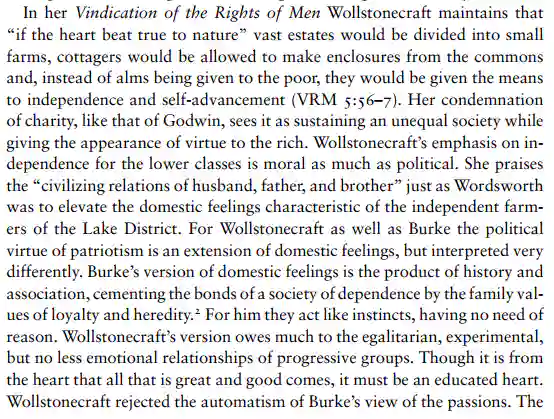
JOHNSON, C. L., (2002), The Cambridge Companion To Mary Wollstonecraft Cambridge Companions To Literature (2002) Page 45
Excerpt: Prof Joel Bakan’s critique of the institution of charity
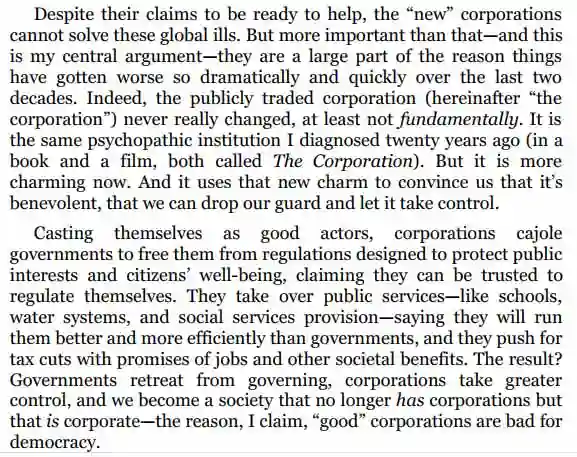
Page 9
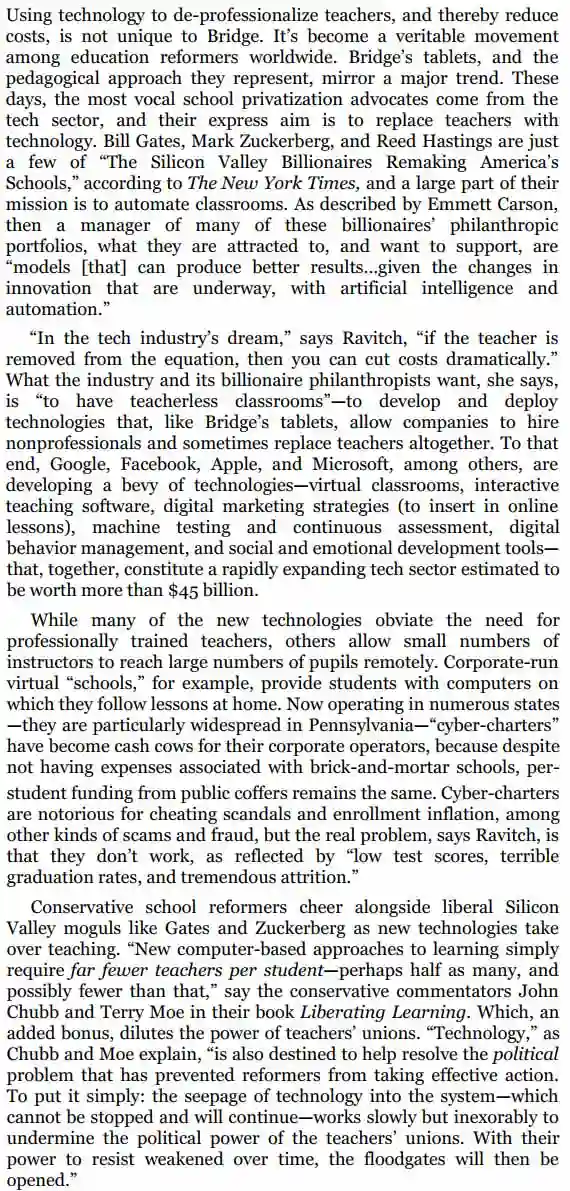
Page 97
BAKAN, J. (2020). The New Corporation: How “good” Corporations Are Bad For Democracy. Vintage Books, A Division Of Penguin Random House
In light of the policy systems of formal education we can find that all policies are equal, but some are more equal than others. Overwhelmingly we find that those which serve the financial bottom line work are given precedence whilst policies that produce indirect economic benefits (I.e. Widening Participation) remain more as aspirational, arbitrary (STEVENSON, CLEGG & LEFEVER, 2010), and tacit bolt-ons used to secure positioning in the industrial policy that governs the sector (EVANS, 1999) through competition (MUSSELIN, 2018; LYNCH & BAINES, 2004; FOTIADOU, 2022).
Excerpt: Widening Participation policies remain more as aspirational, arbitrary, and tacit bolt-ons
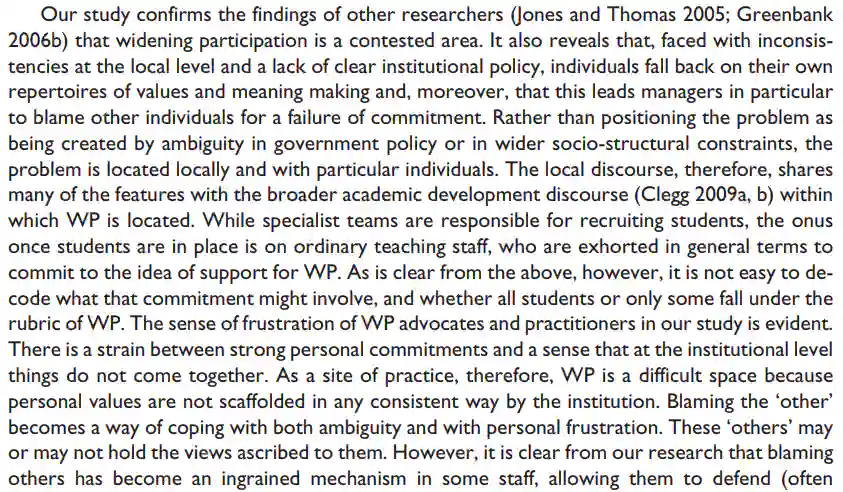
STEVENSON, J., CLEGG, S., And LEFEVER, R., (2010). The discourse of widening participation and its critics: An institutional case study. London Review of Education. 8. 105-115. 10.1080/14748460.2010.487328.
Excerpt: Aspirational policies used to secure positioning in the industrial policy that governs the sector

EVANS, G. R., 1999, Calling Academia To Account; Rights And Responsibilities, The Society For Research Into Higher Education, Open University Press. Page 52
Click to download introduction and chapter one
Excerpt: Industrial policy that governs the sector through competition

MUSSELIN, C., (2018), New Forms Of Competition In Higher Education, Socio-Economic Review, Volume 16, Issue 3, July 2018, Pages 657–683
Excerpt: Industrial policy that governs the sector through competition

LYNCH, R., & Baines, P. (2004). Strategy Development In UK Higher Education: Towards Resource-Based Competitive Advantages. Journal Of Higher Education Policy And Management. 26. 171-187. 10.1080/1360080042000218249
Excerpt: Industrial policy that governs the sector through competition
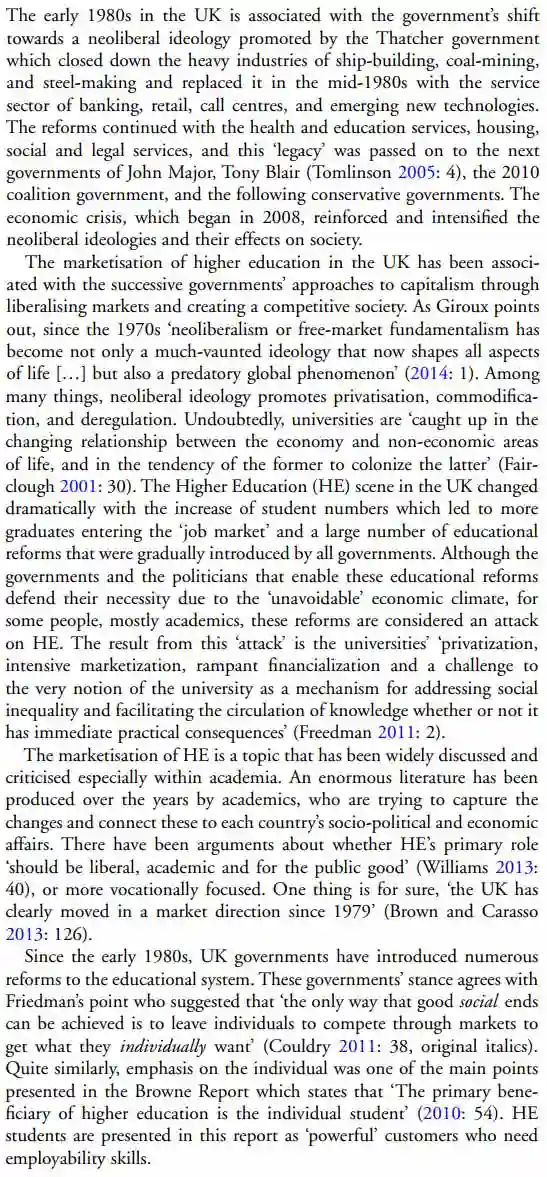
FOTIADOU, M., (2022) The Language Of Employability: A Corpus-Based Analysis Of Uk University Websites, Palgrave Macmillan
In order to get the experience of educators in my local context I interviewed Eurig Scandrett, one of the teachers on the MSc. I asked whether he thought Widening Participation policies are producing equity, he answered “No. Next question.” This confirmed for me my personal experience of Higher Education in Scotland, as well as the trend in my investigations.
The implicit patterning of the status oriented culture of allocation may be indicated by the way that Further Education Institutions (“…in the budget this week there was 420 million pounds found for potholes and no pounds found for further education…” – BERA, 2018; FARQUHARSON, 2021) and Adult Education (SIBIETA, TAHIR & WALTMANN, 2022) have been radically defunded compared to universities, and how universities have been ranked and ordered (BROWN, 2010) in terms of competitive advantage (FOSKETT, 2010) by financial privateers (WILKS, 2016).
Audio recording: Further Education Institutions have been radically defunded …”in the budget this week there was 420 million pounds found for potholes and no pounds found for further education”
BERA, (2018), Consuming Education; BERA Panel On Challenges, Threats & Opportunities Across The Post-Compulsory Sectors. Taken from Internet 2.6.2024: Https://Raggeduniversity.Co.Uk/2018/11/11/Bera-Panel-Post-Compulsory/
Excerpt: Further Education Institutions have been radically defunded
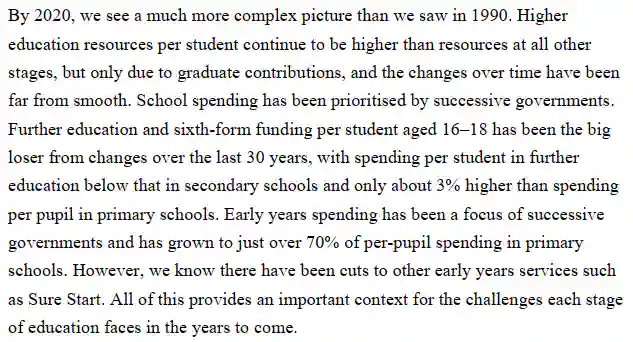
FARQUHARSON, C., Sibieta, L., Tahir, I., Waltmann, B., (2021), IFS Report R204, Annual Report On Education Spending In England, Institute For Fiscal Studies
Excerpt: Adult Education Institutions have been radically defunded

SIBIETA, L., TAHIR, I., WALTMANN, B., (2022), Adult Education: The Past, Present And Future, The Institute For Fiscal Studies © The Institute For Fiscal Studies, June Isbn 978-1-80103-076-2
Excerpt: Universities have been ranked and ordered

BROWN, R., (2010), The March Of The Market, In Molesworth, M., Scullion, R., Nixon, E., The Marketisation Of Higher Education And The Student As Consumer, Routledge Page 15
Click here to download introduction and chapter one
Excerpt: Universities have been ranked and ordered in terms of competitive advantage
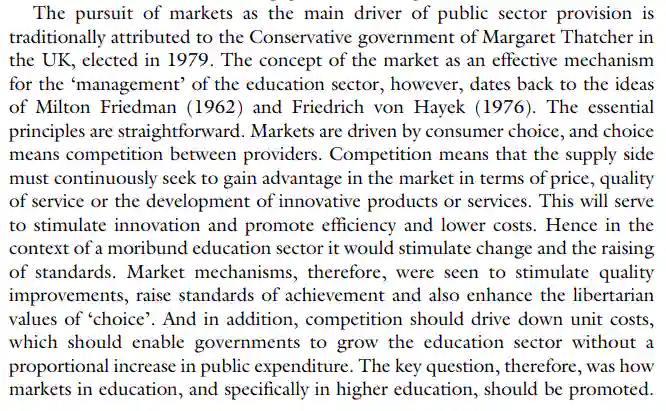
FOSKETT, N., (2010) Markets, Government, Funding And The Marketisation Of Uk Higher Education In Mike Molesworth, Richard Scullion, Elizabeth Nixon – The Marketisation Of Higher Education And The Student As Consumer, Routledge Page 35
Excerpt: Universities have been ranked and ordered in terms of competitive advantage by financial privateers

WILKS, A., (2018), Honor Of The Flag: Privateers And American National Identity, Trinity University
Where Russell group universities like the University of Edinburgh position themselves as a “luxury brand” (SUN, 2022), Glass and Steel universities such as Queen Margaret University construct their “corporate identities” to position themselves superficially in terms of “Social Justice” and “equality and diversity” (QMU, 2023) in order to compete for funding; all whilst marching to the beat of the same aspirational financial and status laden drum.
Excerpt: Universities like the University of Edinburgh position themselves as a “luxury brand

SUN, H (2022). Elite Universities As Luxury Brands In Biagioli, M., & Sunder, M. Academic Brands: Distinction In Global Higher Education. Cambridge University Press. Page 103
Excerpt: Queen Margaret University construct their “corporate identities” to position themselves superficially in terms of “Social Justice” and “equality and diversity”

Taken from Internet 2.6.2024: www.qmu.ac.uk/about-the-university/equality-and-diversity/
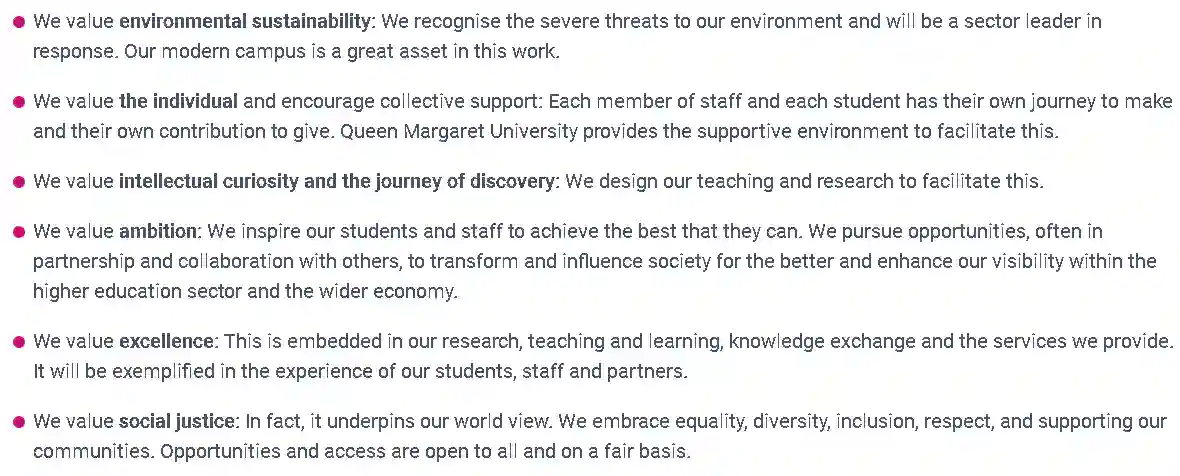
Taken from Internet 2.6.2024: online.qmu.ac.uk/about-us
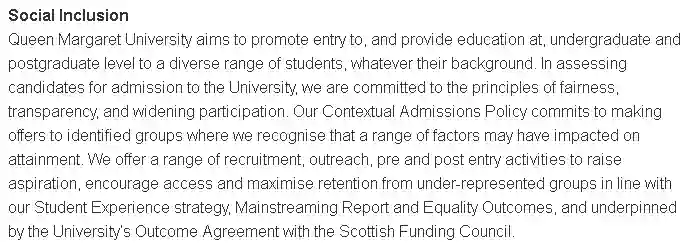
QMU (2023). Taken from Internet 2.6.2024: Https://Www.Qmu.Ac.Uk/Finance/Qmu-Strategic-Report-And-Financial-Statements-2023/Strategic-Report/
This configuration of universities in terms of the marketizing construction of corporate identities conforms to academic brands that produce distinctions in global higher education (BIAGIOLI & SUNDER, 2022). This continues and extends the sociological schemes of distinction which Pierre Bourdieu interrogated in his study of class configuration (BOURDIEU & BENNETT, 2010).
Excerpt: Corporate identities conforms to academic brands that produce distinctions in global higher education
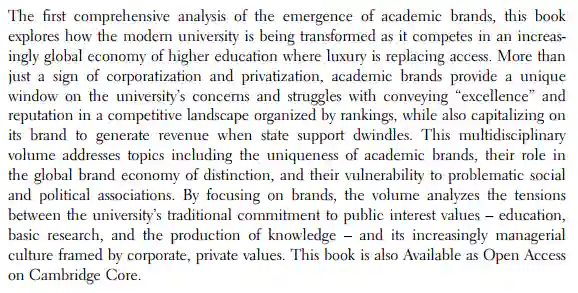
Page 3
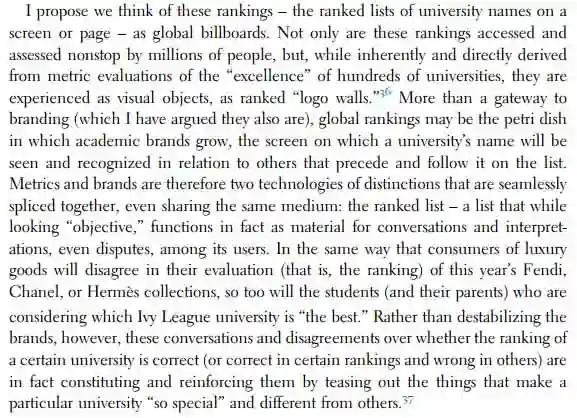
Page 17
BIAGIOLI, M., Sunder, M., (2022), Academic Brands: Distinction In Global Higher Education. Cambridge University Press.
Excerpt: Marketisation continues and extends the sociological schemes of distinction interrogated in Bourdieu’s study of class configuration

BOURDIEU, P., & BENNETT, T. (2010). Distinction : A Social Critique Of The Judgement Of Taste, Routledge. Page 473
Institutionally the situational forces (ZIMBARDO, 2009) of funding constraints are dominantly shaped by those who have money/agency, revealing the gulf between the expression of values and their embodiment; what is said is said, what is done is done. This affects academic freedom and ultimately what the content of education is, both by the industrial policy of government (EVANS, 1999) and by multinational corporations (DUNEDIN, 2015) used to deliver education.
Excerpt: Institutionally the situational forces of funding constraints are dominantly shaped by those who have money/agency
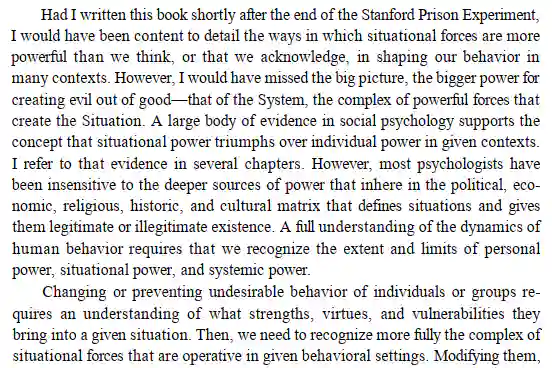
ZIMBARDO, P. G., (2009), ‘The Lucifer Effect: How Good People Turn Evil’, Page x
Click to download introduction and chapter one
Excerpt: Situational forces affect academic freedom and ultimately the content of education by the industrial policy of government
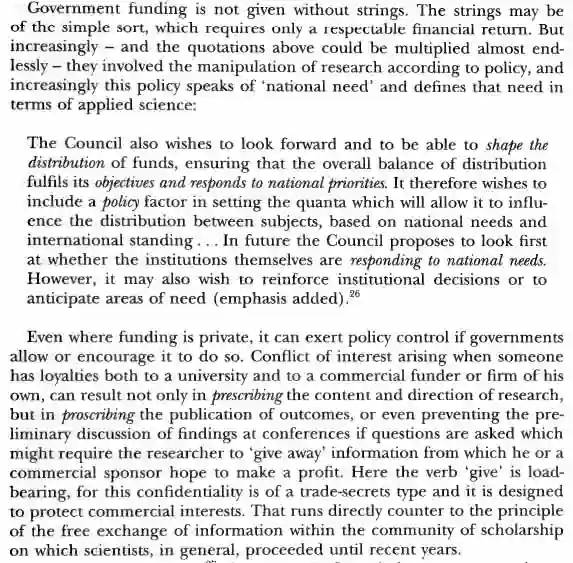
EVANS, G. R., 1999, Calling Academia To Account; Rights And Responsibilities, The Society For Research Into Higher Education, Open University Press. Page 55
Click to download introduction and chapter one
Excerpt: The content of education is, both by the industrial policy of government and by multinational corporations used to deliver education
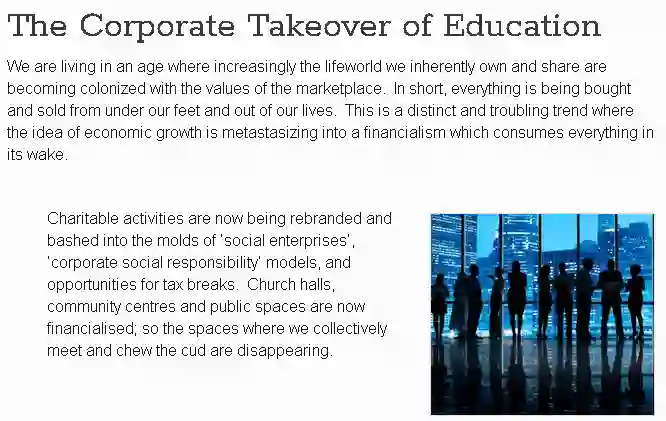
DUNEDIN, A., (2015). Taken from Internet 2.6.2024: The Corporate Takeover Of Education Https://Raggeduniversity.Co.Uk/2015/04/20/Corporate-Takeover-Of-Education/
The university system has been line managed as a business and a small number of people with elite status have disproportionate agency (BODEN & ROWLANDS, 2022) over academia as an institution. Not only this but the exorbitant inflation of executive wages of Vice Chancellors has risen from an average £269,000 in 2021 (HAIRE, 2023) to £325,000 in 2024 (JACK, 2024), ultimately draining money away from teaching and creating perverse incentives similar to executives in the banking crisis.
Excerpt: The university system has been line managed as a business and a small number of people with elite status have disproportionate agency
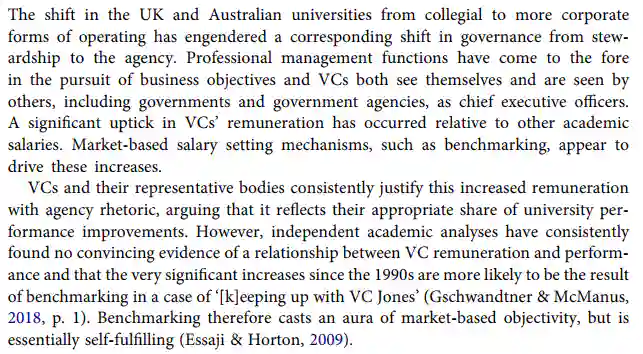
BODEN, R., & Rowlands, J., (2022) Paying The Piper: The Governance Of Vice-Chancellors’ Remuneration In Australian And Uk Universities, Higher Education Research & Development, 41:2, 254-268, Doi: 10.1080/07294360.2020.1841741
Excerpt: Executive wages of Vice Chancellors has risen from an average £269,000 in 2021
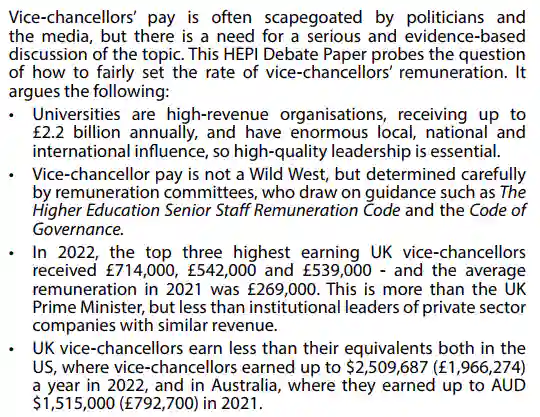
HAIRE, L., (2023), Because you’re worth it: Are vice-chancellors worth the pay they get? Hepi Debate Paper 33, Taken from internet 4.8.24: https://www.hepi.ac.uk/2023/08/31/because-youre-worth-it-are-vice-chancellors-worth-the-pay-they-get/
Excerpt: Executive wages of Vice Chancellors has risen to an average of £325,000 in 2024

JACK, P., (2024), Average vice-chancellor pay rises to £325,000 despite sector crisis, Times Higher Education, Taken from internet 1.8.24: https://www.timeshighereducation.com/news/average-vice-chancellor-pay-rises-ps325000-despite-sector-crisis
This is compounded in the drift of Overton window in UK policy (ABDOU, 2020) illustrated by the fact that even conversations of traditional British political economy positions of ‘mixed market economics’ (a middle view situated amongst left-right dichotomies) have been reframed in rhetoric as socialist endeavours by denigrating narratives of ‘radical leftism’ incompatible with ‘the way the world operates’, that is, through competitive and unregulated market forces.
Excerpt: The drift of Overton window in UK policy

ABDOU FILALI-ANSARY (2020), Occasional Paper Series Uk Think-Tanks, The War On Terror And The Radicalisation Debate Hadi Enayat, Occasional Paper No. 4, Issn 2633 – 8890, Page 7
Perspectives on public goods are parsed through a sieve of language that casts every discussion in terms of dichotomous binaries unrepresentative of third position perspectives; these viewpoints which lack any constituted middle fail to representation non-binary understandings of the world. This concludes my analytic account of the context in which educators are working in the UK and beyond.
In the final part I will summarize my argument that the valuation of the knowledge I have produced outside of academia and opening of opportunity to a Masters course was an act of Public Sociology by the educators. The hope for education as a public good resides in humanised Public Sociology responses I have exemplified here.
Conclusion
Queen Margaret University is a clear example of the Neoliberal capture of the university blighted by multinational corporations ingraining surveillance capitalism and scientific management in all it does. The teachers teach and the students learn in spite of the broken corporate systems and tools. The high pedagogical standard may indicate that only driven individuals can endure in such corrosive landscapes.
I argue the enactment of Widening Participation policy in terms of Social Justice was an act of Public Sociology as in the operational context as such policy is sinecure lip service in UK Higher Education in its process of privatisation as a financial product.
Without the teachers valuing my knowledge as innately owned human capital and fighting for my inclusion on the course, there is no way I could access that educational opportunity given my means and lack of formal educational qualifications. In practical terms this validates me in a society which [actively] devalues those without formal educational qualification, and as a result causes multiple harms measurable in physical and psychological medical measures resulting in illness and early death.
Bibliography of References
ABDOU FILALI-ANSARY (2020), Occasional Paper Series Uk Think-Tanks, The War On Terror And The Radicalisation Debate Hadi Enayat, Occasional Paper No. 4, Issn 2633 – 8890, Page 7
ARTHUR, M., Education And The Law 2001-Dec Vol. 13 Iss. 4 The Human Rights Act And Higher Education (2001) P53
ATIYAH, P. S. (2003). The Rise And Fall Of Freedom Of Contract. Oxford: Clarendon Press. Page 67
BAKAN, J. (2020). The New Corporation : How “good” Corporations Are Bad For Democracy. Vintage Books, A Division Of Penguin Random House
BALLANTYNE, E., MACLEAN, K., COLLIE, S-A., DEEMING, L., And FRASER, E., (2022), ‘Mad People’s History And Identity: A Mad Studies Critical Pedagogy Project’ In Scandrett, E. (Ed.). Public Sociology As Educational Practice: Challenges, Dialogues And Counterpublics. Bristol University Press.
BELL, S., (2022), The Bigger Picture Uk Social Mobility – A Tough Climb, Taken from Internet 2.6.2024: Https://Www.Goldmansachs.Com/Intelligence/Pages/Gs-Research/Uk-Social-Mobility-A-Tougher-Climb/Report.Pdf
BODEN, R., & Rowlands, J., (2022) Paying The Piper: The Governance Of Vice-Chancellors’ Remuneration In Australian And Uk Universities, Higher Education Research & Development, 41:2, 254-268, Doi: 10.1080/07294360.2020.1841741
BERA, (2018), Consuming Education; Bera Panel On Challenges, Threats & Opportunities Across The Post-Compulsory Sectors. Taken from Internet 2.6.2024: Https://Raggeduniversity.Co.Uk/2018/11/11/Bera-Panel-Post-Compulsory/
BIAGIOLI, M., Sunder, M., Academic Brands: Distinction In Global Higher Education. Cambridge University Press.
BLOOMBERG, (2023). Taken from Internet 2.6.2024: Https://Www.Bloomberg.Com/Graphics/2023-06-Reed-Jobs-Report-Graduates-Face-Worst-Market-In-Five-Years/ Zulfiqar, A. A., White, L., Tartar, A., England’s Graduates Suffer The Worst Jobs Market In Years
BOURDIEU, P., & BENNETT, T. (2010). Distinction : A Social Critique Of The Judgement Of Taste, Routledge.
BROWN, R., (2010), The March Of The Market, In Molesworth, M., Scullion, R., Nixon, E., The Marketisation Of Higher Education And The Student As Consumer, Routledge Page 15
BUCHANAN, M. & Langton, K., (2023), Humiliated Covid Whistleblower Says Boss Tried To ‘break’ Her. Taken from Internet 2.6.2024: Https://Www.Bbc.Com/News/Health-67565498
BURAWOY, M. (2005), ‘2004 American Sociological Association Presidential address: For public sociology’. The British Journal of Sociology, 56 pp. 259-294
BURTON-JONES, A., SPENDER J.-C. (2011), The Oxford Handbook Of Human Capital-Oxford University Press (2011), P.76
BURKE, P. J. J. (2012). The Right to Higher Education : Beyond widening participation. Taylor and Francis. Pp.189
COX, O. C. (1944). Class And Caste: A Definition And A Distinction. The Journal Of Negro Education, 13(2), 139. Doi:10.2307/2292848
DICKINSON, T. (2016). ‘Curing Queers’: Mental Nurses And Their Patients 1935-74. Manchester University Press
DMIP (2021), Daniel Morgan Independent Panel. Taken from Internet 2.6.2024: Https://Webarchive.Nationalarchives.Gov.Uk/Ukgwa/20220331104035/Https://Www.Danielmorganpanel.Independent.Gov.Uk/The-Report/
DUNEDIN, A., (2023), Working Classness as a Topology of Finance and Status. Taken from Internet 2.6.2024: Https://Raggeduniversity.Co.Uk/2023/08/27/Working-Classness-Class-As-A-Topology-Of-Finance-And-Status/
DUNEDIN, A., (2015). Taken from Internet 2.6.2024: The Corporate Takeover Of Education Https://Raggeduniversity.Co.Uk/2015/04/20/Corporate-Takeover-Of-Education/
ERTI, (1998), European Round Table Of Industrialists, November 1998, Job Creation And Competitiveness Through Innovation, ERT, Brussels
EVANS, G. R., 1999, Calling Academia To Account; Rights And Responsibilities, The Society For Research Into Higher Education, Open University Press
FARQUHARSON, C., MCNALLY, S., TAHIR, I., (2022), ‘Education Inequalities’, IFS DEATON Review Of Inequalities. Taken from Internet 2.6.2024: Https://Ifs.Org.Uk/Inequality/Chapter/Education-Inequalities/
FARQUHARSON, C., Sibieta, L., Tahir, I., Waltmann, B., (2021), IFS Report R204, Annual Report On Education Spending In England, Institute For Fiscal Studies
FOUCAULT, M. (1977) ‘The Political Function Of The Intellectual’, Radical Philosophy 17, Summer Pp. 12-14
FOSKETT, N., (2010) Markets, Government, Funding And The Marketisation Of Uk Higher Education In Mike Molesworth, Richard Scullion, Elizabeth Nixon – The Marketisation Of Higher Education And The Student As Consumer, Routledge Page 35
FOTIADOU, M., (2022) The Language Of Employability_ A Corpus-Based Analysis Of Uk University Websites-Palgrave Macmillan
HARVEY, C., Gibson, A., Maclean, M., & Mueller, F. (2024). Philanthropy And The Sustaining Of Global Elite University Domination. Organization, 31(3), 433-457.
HECKSCHER, E. F. (1994). Mercantilism. Routledge: Taylor And Francis. Page 226
JOHNSON, C. L., (2002), The Cambridge Companion To Mary Wollstonecraft Cambridge Companions To Literature (2002) Page 45
HUTTON, W., (2012), ‘Is Better Capitalism Possible; History’s Joke – Extinguish The Left And Create A First Order Crisis In Capitalism’, Keynote Address, Cresc Annual Conference On ‘Promises: Crisis And Socio-Cultural Change’
IFHE, 2022, Institute Of Health Equity Fuel Poverty, Cold Homes And Health Inequalities In The UK. Taken from Internet 2.6.2024: Https://Www.Instituteofhealthequity.Org/Resources-Reports/Fuel-Poverty-Cold-Homes-And-Health-Inequalities-In-The-Uk
INCITE! (2017). The Revolution Will Not Be Funded: Beyond The Non-Profit Industrial Complex. Duke University Press
JRF, 2022, UK Poverty The Essential Guide To Understanding Poverty In The UK, Joseph Rowntree Foundation
JRF, 2024 Imogen TYLER And Sarah CAMPBELL Poverty Stigma: A Glue That Holds Poverty In Place, Joseph Rowntree Foundation
KOTZMANN, J., The Human Rights-Based Approach To Higher Education Why Human Rights Norms Should Guide Higher Education Law And Policy, Oxford University Press (2018)
KROMYDAS, T. (2017) Rethinking Higher Education And Its Relationship With Social Inequalities: Past Knowledge, Present State And Future Potential. Palgrave Commun 3, 1
LINDSEY N. KINGSTON 2018, Human Rights In Higher Education Institutional, Classroom, And Community Approaches To Teaching Social Justice
LAURANCE, J. (2009), Whistleblower Nurse Struck Off Over BBC Film. Taken from Internet 2.6.2024: Https://Www.Independent.Co.Uk/Life-Style/Health-And-Families/Health-News/Whistleblower-Nurse-Struck-Off-Over-Bbc-Film-1669954.Html
LOCKE, R. R. & Spender J.-C. (2011). Confronting Managerialism : How The Business Elite And Their Schools Threw Our Lives Out Of Balance. Zed Books
LYNCH, R., & Baines, P. (2004). Strategy Development In UK Higher Education: Towards Resource-Based Competitive Advantages. Journal Of Higher Education Policy And Management. 26. 171-187. 10.1080/1360080042000218249
MARMOT, M. G., SMITH, G. D., STANSFELD, S., PATEL, C., NORTH, F., HEAD, J., WHITE, I., BRUNNER, E., FEENEY, A., (1991), ‘Health Inequalities Among British Civil Servants: The Whitehall Ii Study’. Lancet 1991;337:1387-1393
MARMOT, M., WILKINSON, R. G. (2003). The Solid Facts. Copenhagen: World Health Organization, Regional Office For Europe. Isbn 9780585492520
MARMOT, M.,Wilkinson, R. G., (2006) [1999]. Social Determinants Of Health (2nd Ed.). Oxford/New York: Oxford University Press. ISBN 9780198565895
MARMOT, M. G. (2005). The Status Syndrome : How Social Standing Affects Our Health And Longevity (1st Owl Books Ed). Henry Holt
MARTINI, M., & ROBERTSON, S. L. (2022). UK Higher Education, Neoliberal Meritocracy, And The Culture Of The New Capitalism: A Computational-Linguistics Analysis. Sociology Compass, 16(12), E13020. Taken from Internet 2.6.2024: Https://Doi.Org/10.1111/Soc4.13020
MOLESWORTH, M., Scullion, R., Nixon, E., (2010), The Marketisation Of Higher Education And The Student As Consumer, Routledge
MONBIOT, G., (2024). Taken from Internet 2.6.2024: Https://Rivercide.Tv/
MUSSELIN, C., (2018), New Forms Of Competition In Higher Education, Socio-Economic Review, Volume 16, Issue 3, July 2018, Pages 657–683
FORBES, (2023), Taken from Internet 2.6.2024: Https://Www.Forbes.Com/Sites/Dereknewton/2023/11/30/Survey-Hiring-Managers-Still-Strongly-Value-A-College-Degree/ NEWTON, D., 2023 Survey: Hiring Managers Still Strongly Value A College Degree
O’BRIEN & STEVENSON, G., (2024), James O’brien Meets Gary Stevenson, LBC,Taken from Internet 2.6.2024: Https://Www.Youtube.Com/Watch?V=46t6nk2vog8
OECD, 2011 Education At A Glance: Oecd Indicators – 2011 Edition. Paris: Oecd
PRITCHARD, R.M. (2012). British Higher Education: “Exceptionalism” In Face Of The Bologna Process? Beiträge Zur Hochschulforschung 29 Jan 2012
QMU (2023). Taken from Internet 2.6.2024: Https://Www.Qmu.Ac.Uk/Finance/Qmu-Strategic-Report-And-Financial-Statements-2023/Strategic-Report/
REAY, D., (2021), The Working Classes And Higher Education: Meritocratic Fallacies Of Upward Mobility In The United Kingdom. Eur J Educ. 2021; 56: 53–64. Taken from Internet 2.6.2024: Https://Doi.Org/10.1111/Ejed.12438
RIMSHA, J.,. 2021 “The Caste System In India During British Raj: (1872- 1941)”, International Journal Of Development Research, 11, (12), 52678- 52683
ROBINS, N., (2017). The Corporation That Changed The World: How The East India Company Shaped The Modern Multinational. Pluto Press, Page X
RUTHERFORD, D., (2020), Personal Correspondence
SCHUPF, H.W. Education For The Neglected: Ragged Schools In Nineteenth-Century England. History Of Education Quarterly. 1972;12(2):162-183. Doi:10.2307/366975
SEN, A. K., (2000), Development As Freedom, Alfred A. Knopf, Inc. (2000) Page 128
SHAXSON, N. (2012). Treasure Islands: Uncovering The Damage Of Offshore Banking And Tax Havens St. Martin’s Griffin.
SHAXSON, N. (2018). The Finance Curse: How Global Finance Is Making Us All Poorer. The Bodley Head.
SHAXSON, N., (2021) Chatter #81 – Nicholas Shaxson on The Finance Curse, Taken from Internet 2.6.2024: https://www.youtube.com/watch?v=SEpzFnNnNY8
SAMBROOK, R., 2015), In Conversation With Journalist, Author And Thalidomide Campaigner, Harold Evans. Taken from Internet 2.6.2024: Https://Theconversation.Com/In-Conversation-With-Journalist-Author-And-Thalidomide-Campaigner-Harold-Evans-48322
SIBIETA, L., TAHIR, I., WALTMANN, B., (2022), Adult Education: The Past, Present And Future, The Institute For Fiscal Studies © The Institute For Fiscal Studies, June Isbn 978-1-80103-076-2
SIMMONS, R., SMYTH, J. (2018). Education And Social Class: How Did We Get To This And What Needs To Change?. In: Simmons, R., Smyth, J. (eds) Education And Working-Class Youth. Palgrave Macmillan, Cham. Taken from Internet 2.6.2024: Https://Doi.Org/10.1007/978-3-319-90671-3_10
SOTIRIS, P., (2017), Higher Education And Class: Production Or Reproduction? In Darder, A., Mayo, P., & Paraskeva, João. (2017). International Critical Pedagogy Reader (First Edition). Taylor And Francis
STEVENSON, J., CLEGG, S., And LEFEVER, R., London Review Of Education Vol. 8, No. 2, July 2010, 105–115 Issn 1474-8460 Print/Issn 1474-8479 Online © 2010 Institute Of Education, University Of London Doi: 10.1080/14748460.2010.487328 Http://Www.Informaworld.Com The Discourse Of Widening Participation And Its Critics: An Institutional Case Study
SUN, H (2022). Elite Universities As Luxury Brands In Biagioli, M., & Sunder, M. Academic Brands: Distinction In Global Higher Education. Cambridge University Press.
TOMLINSON M., & WATERMEYER, R., (2020): When Masses Meet Markets: Credentialism And Commodification In Twenty-First Century Higher Education, Discourse: Studies In The Cultural Politics Of Education
TROUILLOT M.-R. & Carby H. V. (2015). Silencing The Past : Power And The Production Of History. Beacon Press.
UN, 2024. Taken from Internet 2.6.2024: Https://Www.Un.Org/En/About-Us/Udhr/Foundation-Of-International-Human-Rights-Law
WILKS, A., (2018), Honor Of The Flag: Privateers And American National Identity, Trinity University
WYNESS, G., (2016) “Deserving Poor: Are Higher Education Bursaries Going To The Right Students?” Education Sciences 6, No. 1: 5. Taken from Internet 2.6.2024: Https://Doi.Org/10.3390/Educsci6010005
ZIMBARDO, P. G., (2009), ‘The Lucifer Effect: How Good People Turn Evil’
ZUBOFF, S. (2019). The Age Of Surveillance Capitalism : The Fight For A Human Future At The New Frontier Of Power (First Edition). Publicaffairs.
Appendix A: Collaborative Working
This is a reflection on fulfilling the vision in the minds of the teachers of the course in the face of encountering Queen Margaret University as delivered through Neoliberal administrative structures and Educational Technologies built around surveillance capitalism contractors. My experience that the teaching and learning on the course has taken place in spite of the administrative structures and technologies has meant that as an individual I (and others) have had to be adaptive, innovative and inventive in order to reconstitute the educational experience beyond the constraints of the university.
In this module I perceived that collaborative working was a key pedagogical exercise and aim. I imagine the purpose of this is that sociological thinking is a collective activity in itself; Public Sociology especially so. With this in mind, and with the undermining of the course via the Queen Margaret University executive, I have made special efforts to work with other students outside collaborating to help build a website which may offer a home to Mad scholars under the direction of Julia MacIntosh.
As well as this, due to the education being forced online into poorly configured, dysfunctional educational technologies, I have made special efforts to have conversations with and interview Public Sociologists and educators in order to ensure that the experiences of those employed in academia were guiding my research. The imposition of educational technologies and distance learning has yet to be problematised. Many issues which interrupt cognitive processes are actively avoided by the Higher Education sector partly because they are so invested and ultimately already in capture to large companies such as Microsoft and private equity firm Thoma Bravo (Canvas).
Not only this but there are growing bases of evidence that the constriction of face to face interaction and exposure to environments which produce what B. F. Skinner identified as Mixed Schedule Reinforcement patterns resulting in measurable psychological, affective and cognitive harms. All the more reason to reconstitute the pedagogical experience via the production of a human environment by the creation of public events (Ragged University), discussion with thinkers in the field, and the production of learning artefacts such as interviews. A key strategy has been to ‘learn through being helpful’, where reading over other people’s work and feeding back is a powerful means of learning about its contents drawing on the active listening skills associated with Carl Rogers.
Appendix B: Socio-Economic Solipsism of Management Executives
Queen Margaret University looks to be significantly manifesting the kind of Managerial Elitism and scientific management described by Locke and Spender (2011) in their book ‘Confronting Managerialism: How The Business Elite And Their Schools Threw Our Lives Out Of Balance’. Looking at the executive make up it is interesting and unusual that Sir Paul Grice holds two senior executive positions in the organisational structure – that of Principal and also that of Vice-Chancellor.
Also serving as the Vice-Convener of the leadership team at Universities Scotland, it is suggestive of a kind of sociological solipsism common to cultures of managerialism. A revealing detail of this was given by Will Hutton during the 2012 CRESC annual conference in which he spoke on “Is Better Capitalism Possible” (HUTTON, 2012). In it he pointedly stated “there is an issue in the HE sector because we are all sitting on each others boards”, arguing there is not the diversity in these spaces for “healthy capitalism” to take place. This managerial solipsism is eroding the pedagogical environment.
Considering the branding of equality and diversity which it markets itself with, the use of titles designed to set people over others is arguably anathema to its projected identity. Not only this but it is poor optics in terms of tax arrangements if we take into consideration that the work of David Marchant who runs a financial investigation organisation called Offshore Alert. Marchant states that when he’s investigating a corporate structure, and see’s a ‘Lord’ or a ‘Sir’ or one of these kind of British appellations in a corporate structure he treats it as a red flag. They call it “having a lord on the board” and regard it as a kind of a way of legitimizing tax arrangements which lead offshore to tax havens. This is not to say that this reflects Sir Paul Grice’s situation, but it is to raise the question of what is happening at a larger scale as a part of the Neoliberal project which is documented.
Returning to the work of Nicholas Shaxson whom Professor Simon Szreter put me onto as “probably one of the most important commentator in our current age”, Shaxson points out the endemic nature of tax avoidance, offshore business and ultimately erosion of the nation state as a representative legislature. In an interview he states: “You put one of these fancy names on and people think ‘oh this is all right and proper’ but what this is really telling us is that the whole establishment has become deeply corrupted by this stuff… the tax haven world totally suffuses our political establishment, particularly in the UK the Conservative party but the Labour party is certainly not immune. So there’s a whole kind of political capture going on” (SHAXSON, 2021).
Audio recording: Nicholas Shaxson discusses political capture by tax havens and offshore business
SHAXSON, N., (2021) Chatter #81 – Nicholas Shaxson on The Finance Curse, Taken from Internet 2.6.2024: https://www.youtube.com/watch?v=SEpzFnNnNY8
With this as a back drop and having university services, infrastructure and environments delivered by organisations such as Starbucks, which are also known to be heavy invested in tax havens, the optics aggregate to suggest a socio-economic solipsism of management executives which does not bode well for the public interest; or at least people who do not hold shares in the multinationals which are capturing higher education.
With gratitude and thanks to Prof Marion Ellison and the educators at Queen Margaret University who fought and won a battle for public goods. This essay is dedicated to them for recognising knowledge outside of formal academia and valuing it thus enabling me to enter a Masters course.
